Oklahoma Documents
Quitclaim Deed
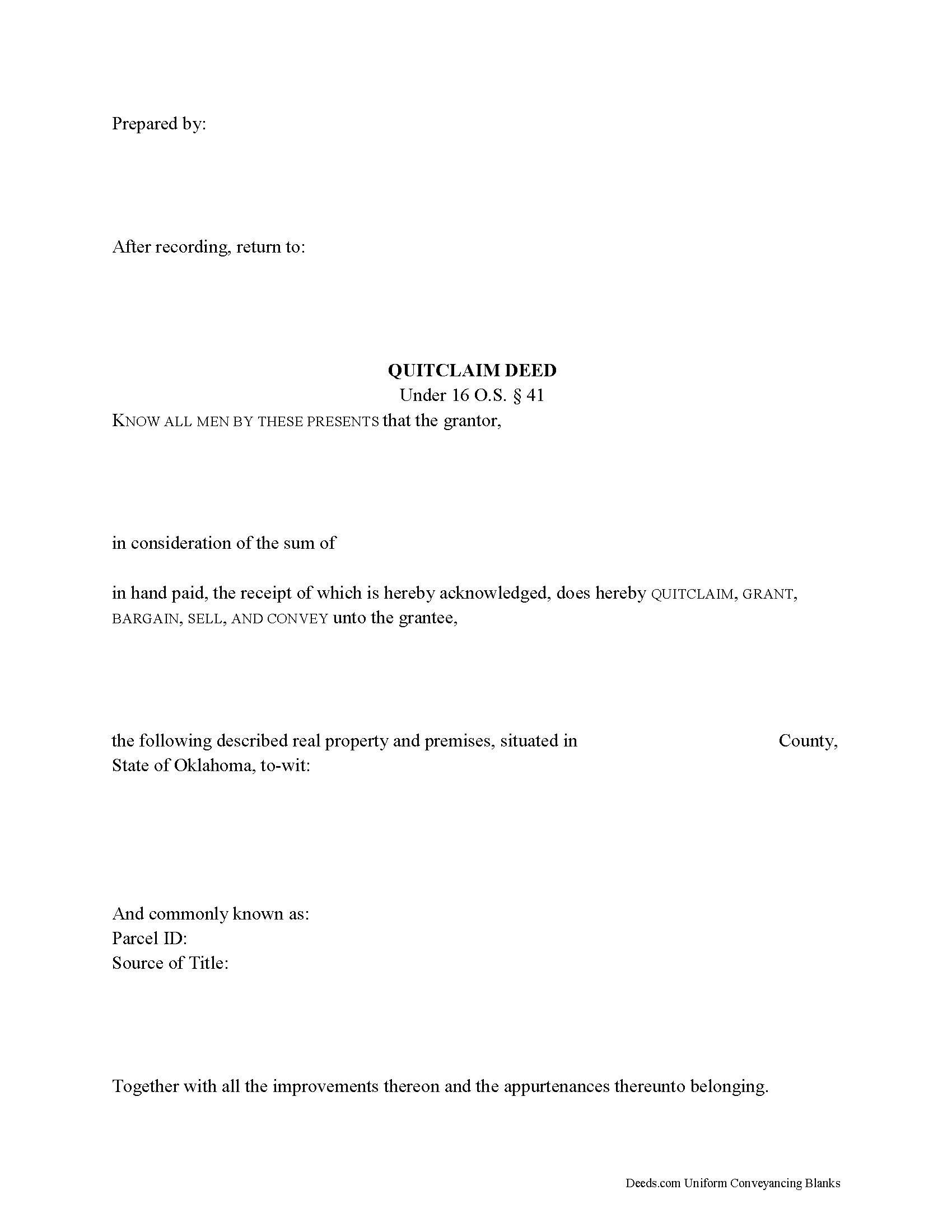
In Oklahoma, interest in real property can be transferred from one party to another by executing a quitclaim deed. Quitclaim deeds are statutory in Oklahoma under 16 O.S. Section 41, and they convey all the right, title, and interest of the grantor to and in the property (16 O.S. Section 18). This type of deed only conveys the interest the grantor may have at the time the deed is executed, but it does not guarantee that the grantor has good title or right to the property.
Quitclaim deeds offer no warranties of title and provide the least amount of protection to the grantee (buyer). They are generally reserved for divorces and other transfers of property between family members. Quitclaim deeds do not offer the same assurances as general warranty deeds, which convey real property with the most assurance of title, or special warranty deeds, which only guarantee the title against claims that arose during the time the grantor held title to the property.
A lawful quitclaim deed includes the grantor's full name, mailing address, and marital status; the consideration paid for the transfer; and the grantee's full name, mailing address, marital status, and vesting. Vesting describes ... More Information about the Oklahoma Quitclaim Deed
Gift Deed

A gift deed, or deed of gift, is a legal document voluntarily transferring title to real property from one party (the grantor or donor) to another (the grantee or donee). A gift deed typically transfers real property between family or close friends. Gift deeds are also used to donate to a non-profit organization or charity. The deed serves as proof that the transfer is indeed a gift and without consideration (any conditions or form of compensation).
Valid deeds must meet the following requirements: The grantor must intend to make a present gift of the property, the grantor must deliver the property to the grantee, and the grantee must accept the gift. A gift deed must contain language that explicitly states no consideration is expected or required, because any ambiguity or reference to consideration can make the deed contestable in court. A promise to transfer ownership in the future is not a gift, and any deed that does not immediately transfer the interest in the property, or meet any of the aforementioned requirements, can be revoked [1].
A lawful gift deed includes the grantor's full name and marital status, as well as the grantee's full name, marital status, mailing ad... More Information about the Oklahoma Gift Deed
Warranty Deed
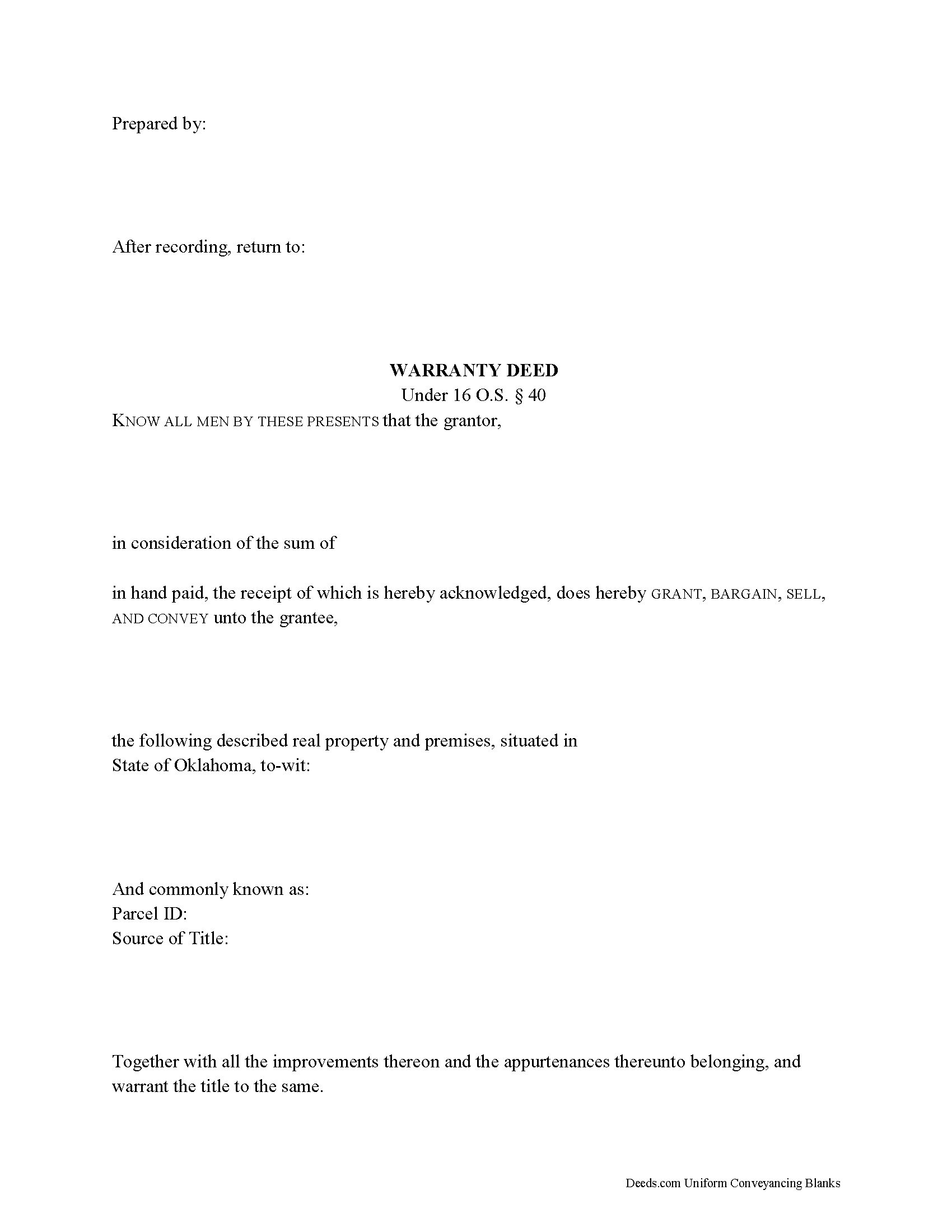
In Oklahoma, title to real property can be transferred from one party to another by executing a warranty deed. Warranty deeds are statutory in Oklahoma under 16 O.S. Section 40, and they convey real property in fee simple with the most assurance of title.
In its statutory form, a warranty deed contains covenants that the grantor holds title to the property and has good right to convey it; that the property is free from encumbrances (with the exception of any noted in the deed); and that the grantor will defend the title against all lawful claims (16 O.S. Section 19). This warranty of title is greater than that of a limited or special warranty deed, which guarantees the title only against claims that arose during the time the grantor held title to the property, or a quitclaim deed, which offers no protections at all for the grantee.
A lawful warranty deed includes the grantor's full name, mailing address, and marital status; the consideration paid for the transfer; and the grantee's full name, mailing address, marital status, and vesting. Vesting describes how the grantee holds title to the property. Generally, real property is owned in either sole ownership or in co-ownershi... More Information about the Oklahoma Warranty Deed
Special Warranty Deed
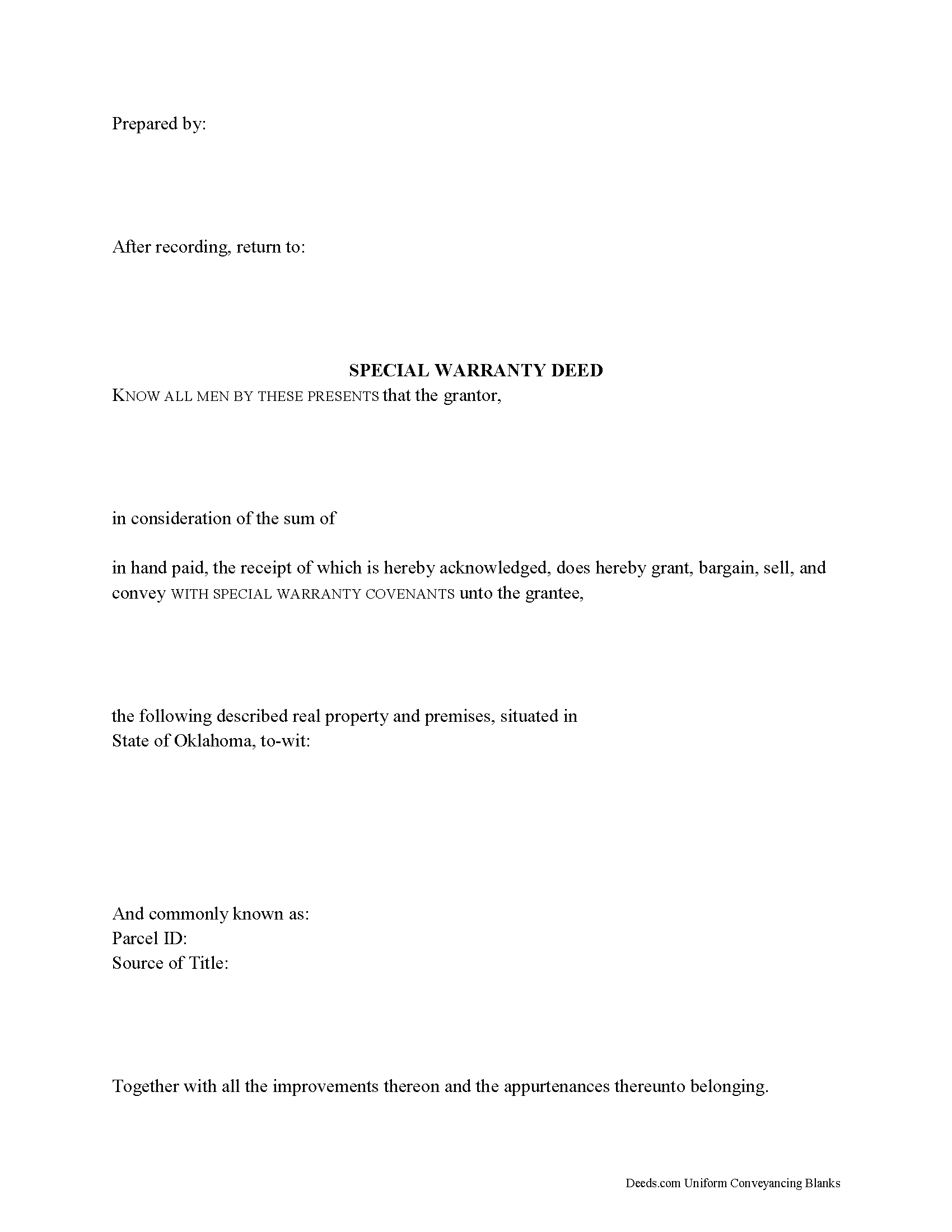
In Oklahoma, title to real property can be transferred from one party to another by executing a special warranty deed. A special warranty deed conveys an interest in real property to the named grantee with limited warranties of title.
Special warranty deeds include covenants that the grantor holds title to the property and has good right to convey it; that the property is free from encumbrances that arose during the time that the grantor held title to the property (with the exception of any noted in the deed); and that the grantor will defend the title against anyone who may lawfully claim the same by, through, or under him or her. This warranty of title is more limited than that of a full warranty deed, which states that the grantor will defend the title against all claims, in addition to all of the previously noted covenants (16 O.S. Section 19). A special warranty deed only guarantees the title against claims that arose during the time the grantor held title to the property.
A lawful special warranty deed includes the grantor's full name, mailing address, and marital status; the consideration paid for the transfer; and the grantee's full name, mailing address, marital sta... More Information about the Oklahoma Special Warranty Deed
Grant Deed
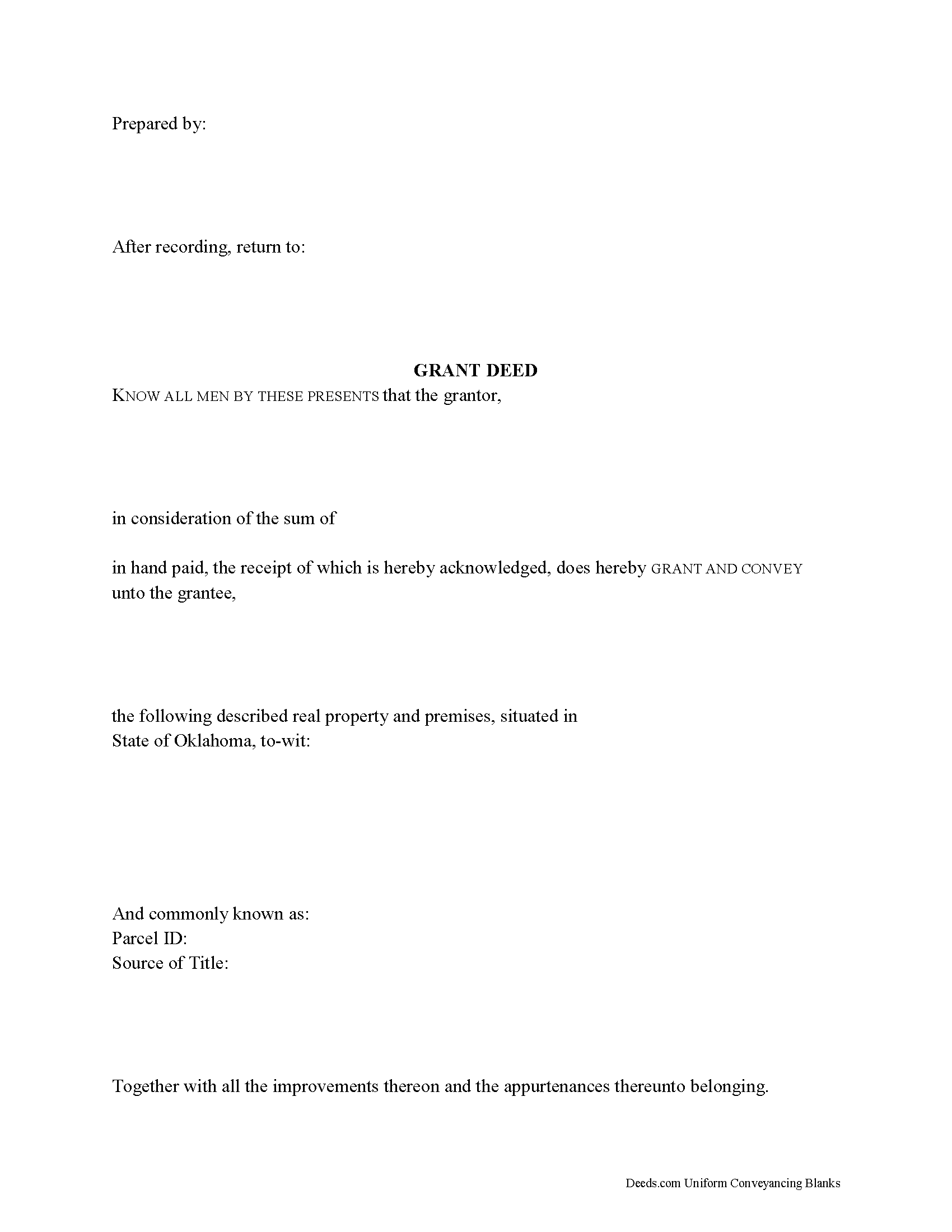
In Oklahoma, title to real property can be transferred from one party to another by executing a grant deed. A standard grant deed conveys an interest in real property to the named grantee with covenants that the title is free of any encumbrances (except for those stated in the deed) and that the grantor holds an interest in the property and is free to convey it. These covenants should be explicitly stated in the text of the deed.
A lawful grant deed includes the grantor's full name, mailing address, and marital status; the consideration given for the transfer; and the grantee's full name, mailing address, marital status, and vesting. Vesting describes how the grantee holds title to the property. Generally, real property is owned in either sole ownership or in co-ownership.
For Oklahoma residential property, the primary methods for holding title are tenancy in common, joint tenancy, and tenancy by entirety. A conveyance of real estate to two or more persons creates a tenancy in common, unless otherwise specified. Only spouses can declare a tenancy by entirety (60 O.S. Section 74).
As with any conveyance of realty, a grant deed requires a complete legal description of the ... More Information about the Oklahoma Grant Deed
Correction Deed
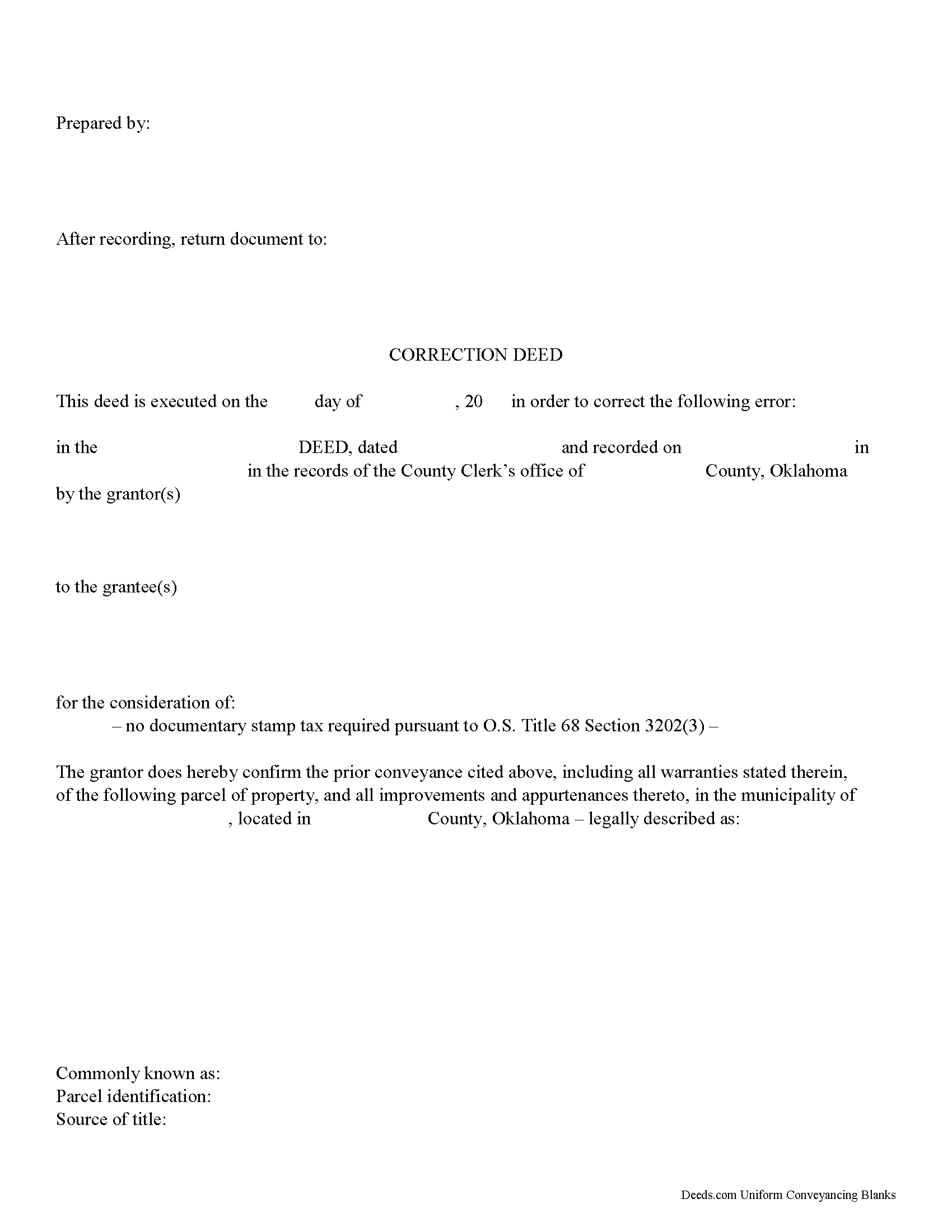
In Oklahoma, use a correction deed to amend a previously recorded deed that contains a minor error.
A corrective deed is, in effect, an explanation and correction of an error in a prior instrument. As such, it passes no title and, except for the corrected item, reiterates and confirms the prior conveyance. It should be executed from the original grantor to the original grantee, and it needs to be recorded in order to be legally valid.
The correction deed must reference the original conveyance it is correcting by type of error, date of execution and recording, as well as by recording number and location. Beyond that, it restates the information given in the prior deed, which remains on record, usually with a marginal notation to the corrective instrument.
Deeds of correction are most appropriate for minor errors and omissions in the original deed, such as misspelled names, omission of marital status, or typos in the legal description. More substantial changes, such as adding a name to the title, changing vesting information or legal description of the property, may require a new deed of conveyance instead of a correction deed.
Correction deeds are exempt from deed rec... More Information about the Oklahoma Correction Deed
Easement Deed
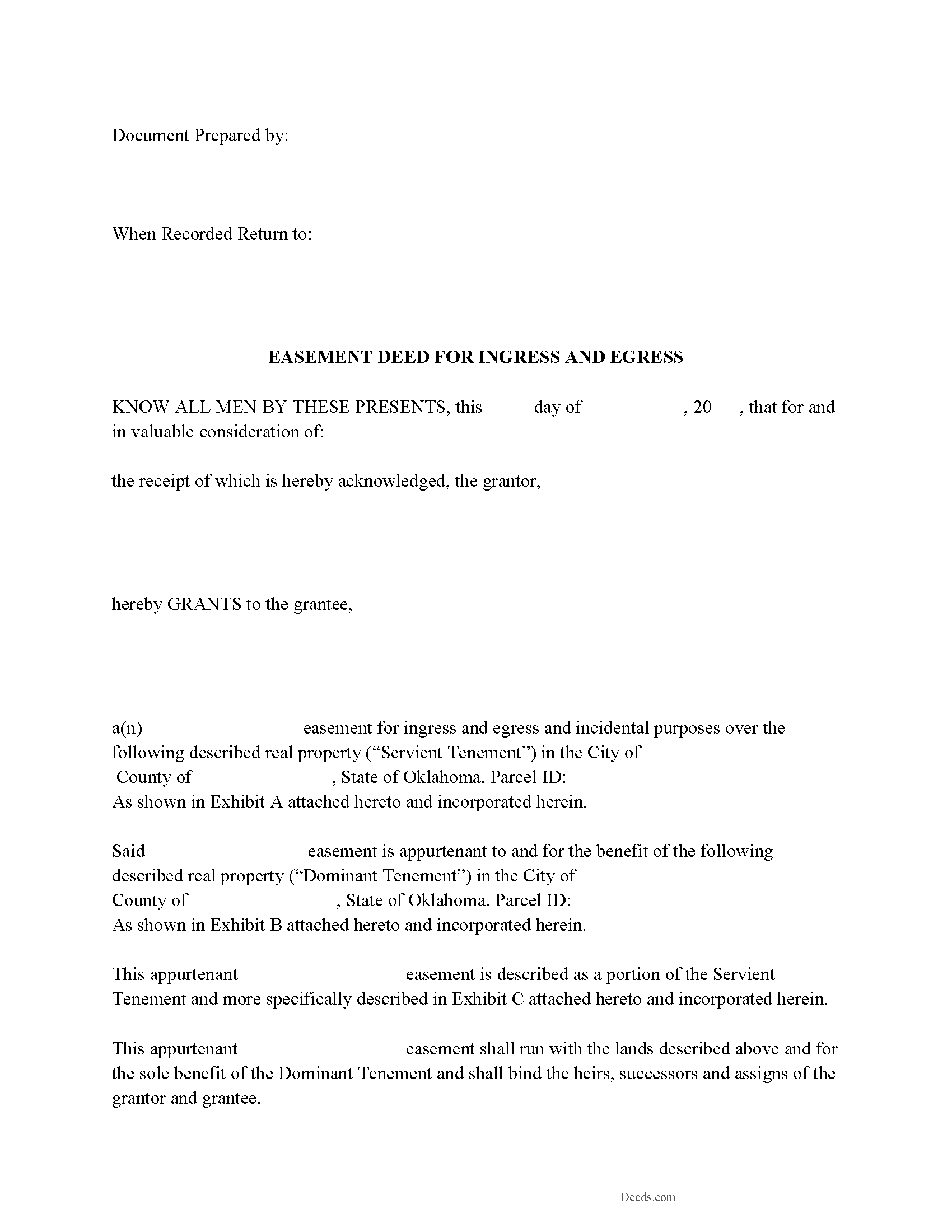
In order to operate, an easement needs a dominant estate and a servient tenement. The land that an easement is attached to is called the dominant estate, and the land upon which a burden or servitude is laid is called the servient tenement (60 51). A servitude can only be created by a person who has a vested estate in the servient tenement (60 52). Oklahoma statutes 60-49 lists land burdens or servitudes upon land which may be attached to other land as incidents or appurtenances, and are then called easements. Some land burdens or servitudes upon land may be granted and held, though not attached to land (60 50). A conservation easement is a non-possessory interest of a holder in real property imposing limitations or affirmative obligations for the purpose of retaining or protecting the natural, scenic, or open-space values of real property (60-49.2). This type of easement is created, conveyed, recorded, assigned, released, modified, terminated, or otherwise altered in the same manner as other easements in Oklahoma (60-49.3). The extent of an easement in Oklahoma is determined by the terms of the grant or the nature of enjoyment by which it was acquired (60 54). The easement deed is... More Information about the Oklahoma Easement Deed
Termination of Easement
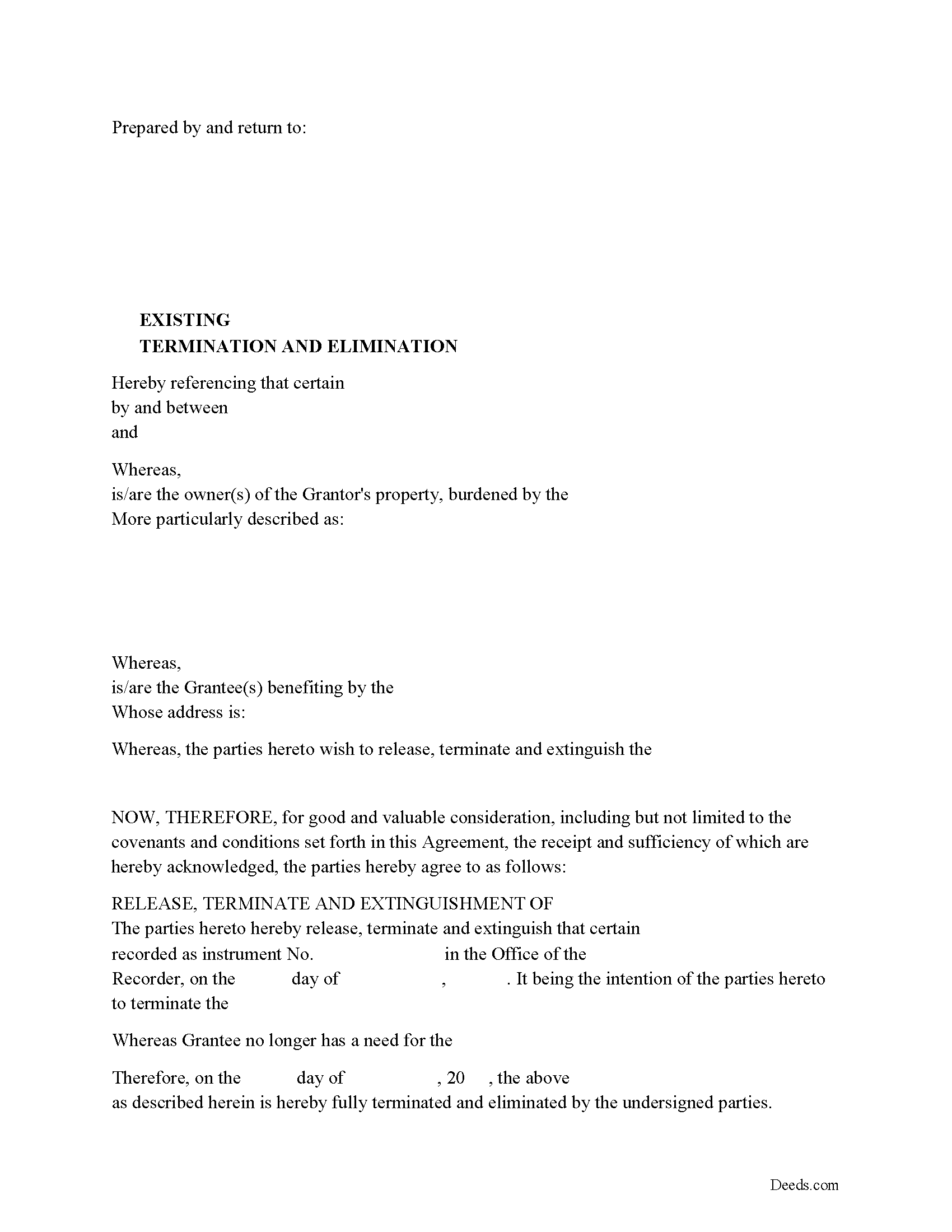
Use this form to release, terminate, extinguish a previously recorded document that involves access to and from a property.
Documents such as:
1. Easement Deeds or Agreements (An easement is a non-possessory interest in land, granting the right to use someone else's property for a specific purpose, like a driveway or utility line)
2. Access Roads
3. Right of Ways
4. Utility Easements (Power, Gas, Water, Sewer, Etc.)
5. Drainage Easements
This document allows the owner of the land, burdened by the access and the party that benefits from the access, to sign an agreement releasing the property from such access, ... More Information about the Oklahoma Termination of Easement
Mortgage and Promissory Note
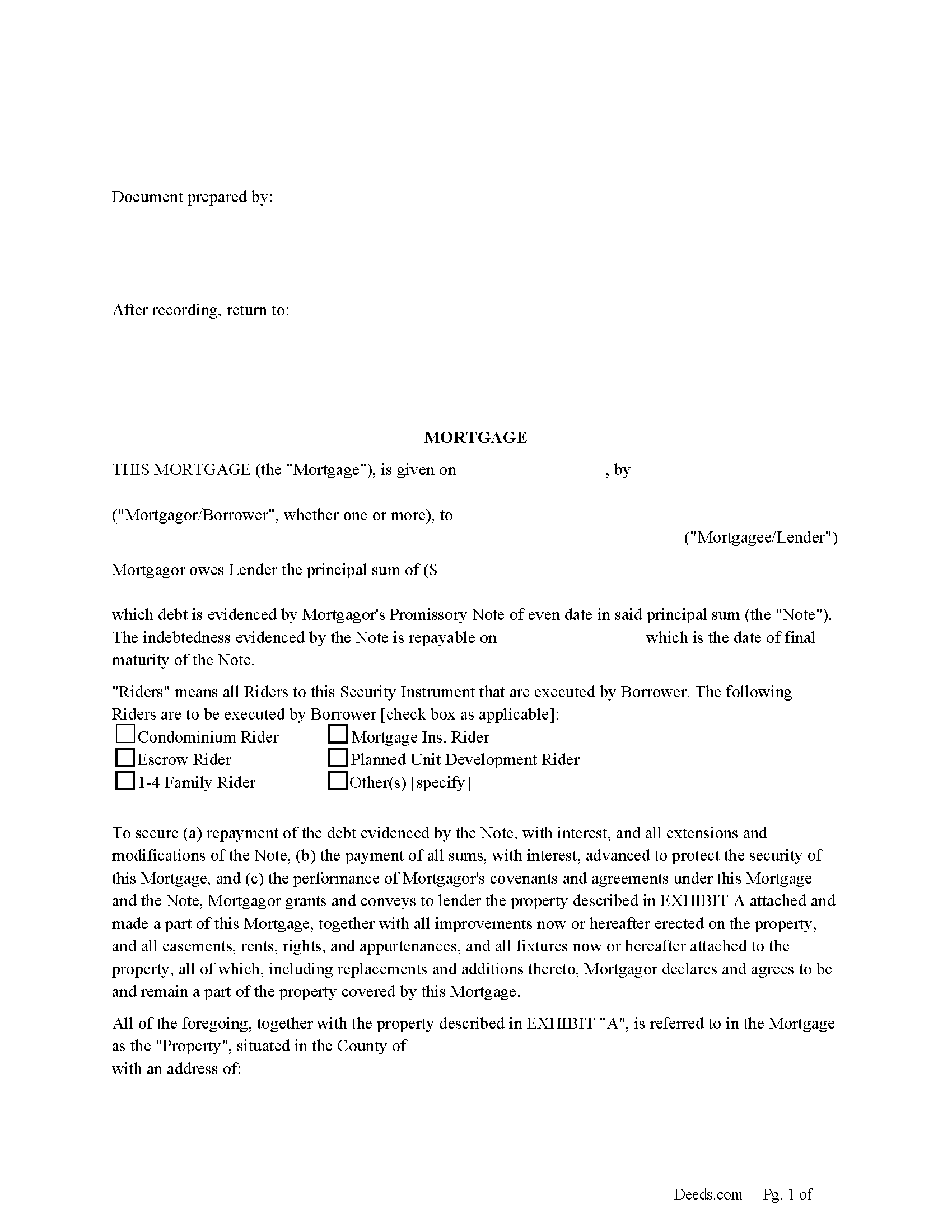
Mortgages are liens against property when the property owner borrows money from a lending institution or individual. This form can be used for residential, rentals, small commercial, vacant land and planned unit developments. This form contains a power of sale clause which allows for a non-judicial foreclosure in the event of default.
(2. with respect to any mortgage in which a power of sale is granted: a. the mortgage shall state in bold and underlined language, substantially the following:
"A power of sale has been granted in this mortgage. A power of sale may allow the mortgagee to take the mortgaged property and sell it without going to court in a foreclosure action upon default by the mortgagor under this mortgage,") ( 46 OK Stat 46-43) Many lenders prefer a mortgage with power of sale, it can save time and expense if a foreclosure occurs.
Secured by the mortgage is a promissory note (promise to pay) form. The obligations of Borrower to Lender under this Note and the Additional Obligations heroin remain in full force and effect until Lender has received payment in full of all obligations. The note ... More Information about the Oklahoma Mortgage and Promissory Note
Full Release and Discharge of Mortgage
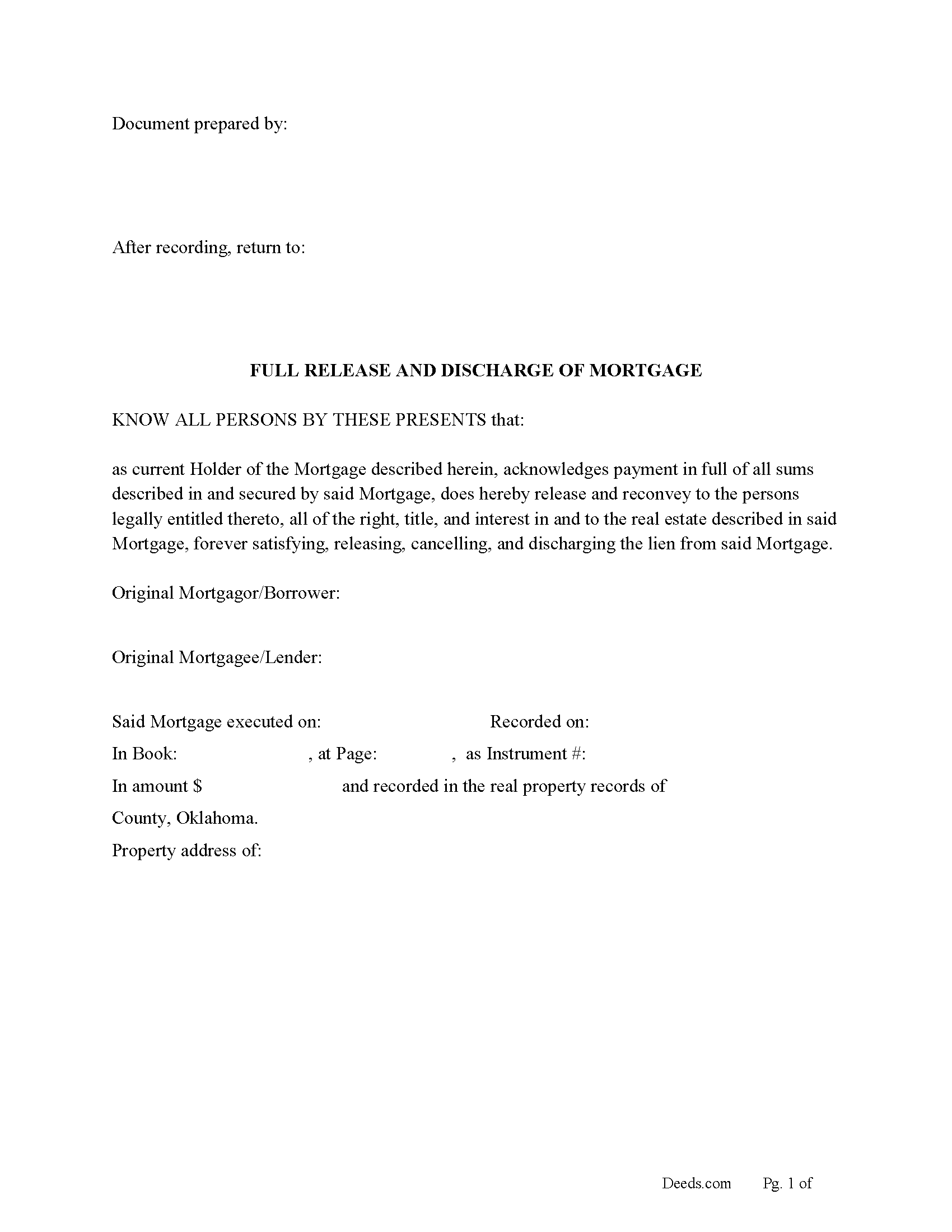
Use this form to release a mortgage when it has been paid in full.
A mortgage on real property may be released by written instrument, duly signed and acknowledged and recorded in the office of the county clerk as register of deeds. (OK Statute 46-16. How released.)
Generally, the mortgagee/lender has 50 days to release a mortgage to avoid penalty.
[A. Any mortgage on real estate shall be released by the holder of any such mortgage within fifty (50) days of the payment of the debt secured by the mortgage and the holder of the mortgage shall file the release of the mortgage with the county clerk where the mortgage is recorded. If, at the end of the fifty-day period, the holder has failed to release the mortgage, the mortgagor may at any time request in writing the holder of the mortgage to release the mortgage and the holder of the mortgage shall have ten (10) days from the date of the request to release such mortgage. If the holder of the mortgage fails to release the mortgage by the end of such ten-day period, he shall then forfeit and pay to the mortgagor a penalty of one percent (1%) of the principal de... More Information about the Oklahoma Full Release and Discharge of Mortgage
Transfer on Death Deed
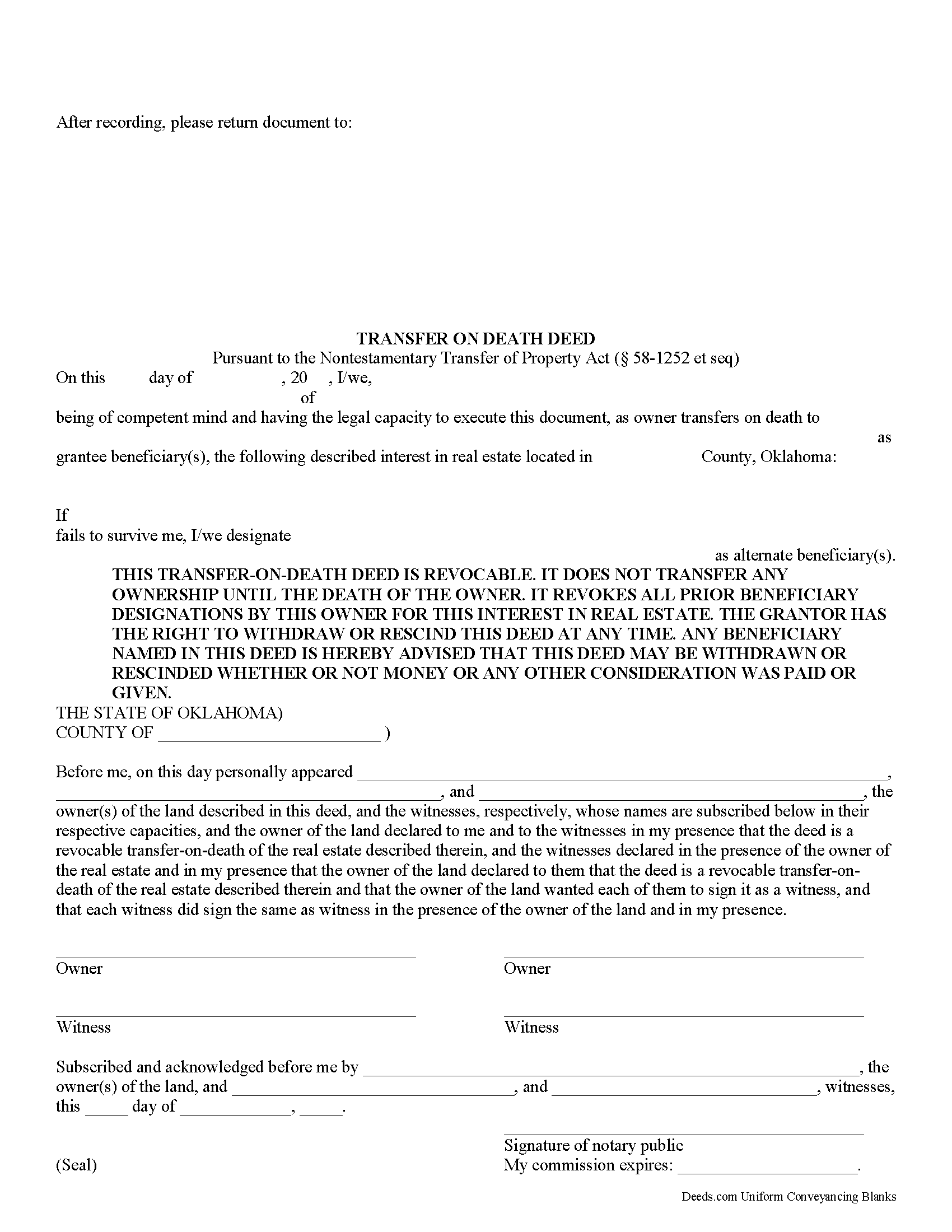
Transfer on death deeds (TODDs) in Oklahoma are governed by the Nontestamentary Transfer of Property Act (Title 58 O.S. 1251-1258), enacted in 2008. This law allows owners of interests in real property located in Oklahoma to designate one or more beneficiaries to receive those interests after the owner dies, but without the need for probate.
Owners who execute and record a TODD retain absolute control over and use of the property interest while living. In addition, they may modify, revoke, or otherwise convey the land any way they wish, without penalty or obligation to the beneficiaries. This is possible because unlike a traditional conveyance, there is no delivery requirement to notify the beneficiaries about what they might receive -- the deed only conveys a potential future interest in whatever remains after the owner's death ( 58-1252(B), 1257).
The statutes define an interest in real property to include "any estate or interest in, over or under land, including surface, minerals, structures and fixtures" ( 58-1252)(A)), meaning that the transfer is not limited to land, but can also include mineral rights and royalties.
Even though a TODD is not impacted by the owne... More Information about the Oklahoma Transfer on Death Deed
Transfer on Death Revocation
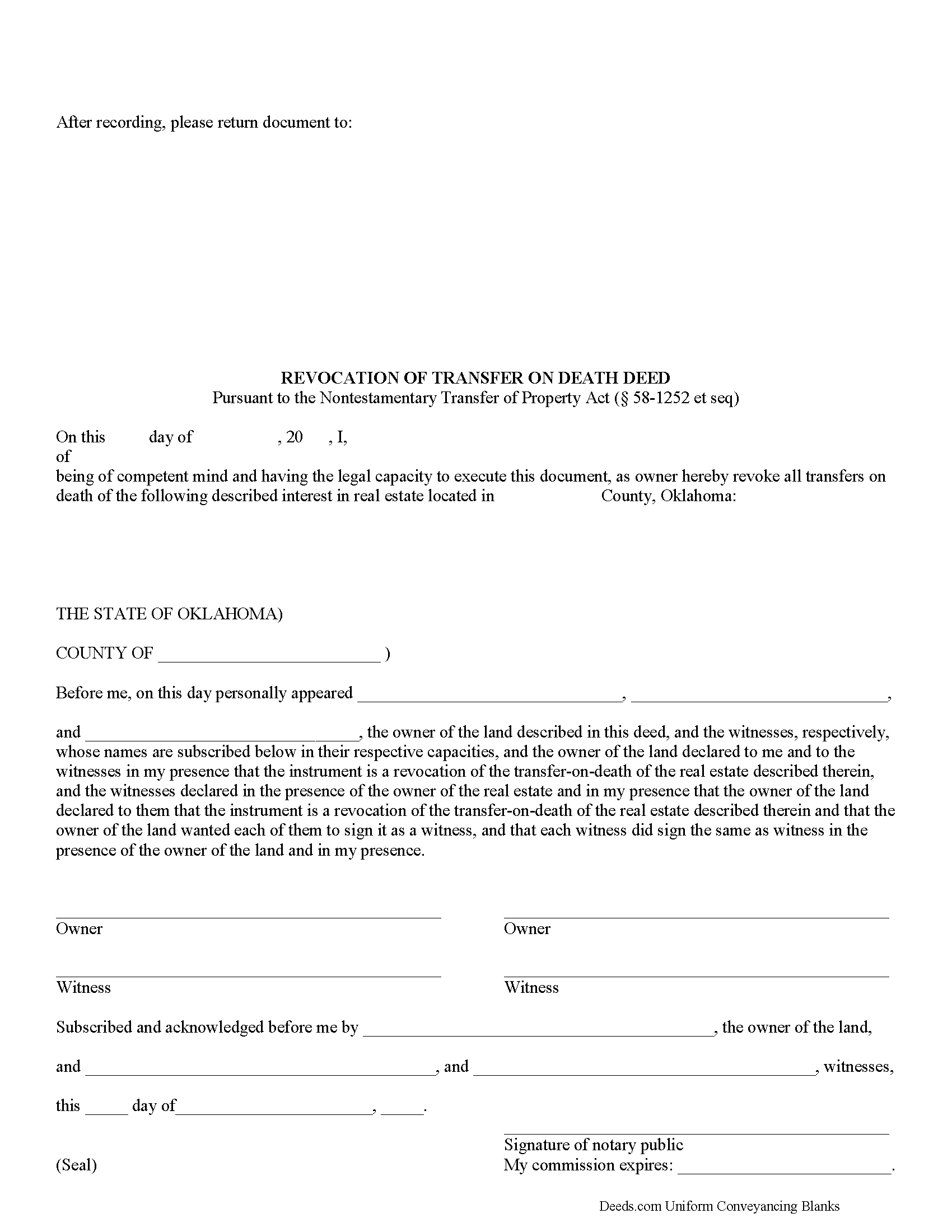
Transfer on death deeds (TODDs) in Oklahoma are governed by the Nontestamentary Transfer of Property Act (Title 58 O.S. 1251-1258), enacted in 2008.
Unlike standard deeds, which convey an irrevocable interest in real property, transfer on death deeds may be changed or cancelled, provided that any modifications to the recorded TODD are filed, during the owner's life, for recording with the same office that accepted the TODD. The Oklahoma Statutes do not provide a specific form for this purpose, but they define the requirements for lawful revocation at 58-1254.
Basically, there are two ways to revoke a transfer on death deed in Oklahoma. The owner can execute and record a new TODD, conveying the potential future interest to someone else, effectively cancelling the earlier transfer (58-1254(B)). The other method involves executing and recording an instrument of revocation (58-1254(A)). Just as with TODDs, this instrument must be recorded during the owner's life. Revocation instruments are useful because they serve as a clear statement of the transferor's intent. TODDs may not be revoked by a will (58-1254(C)).
(Oklahoma TOD Revocation Package includes form, guidelines, and ... More Information about the Oklahoma Transfer on Death Revocation
Transfer on Death Affidavit of Acceptance
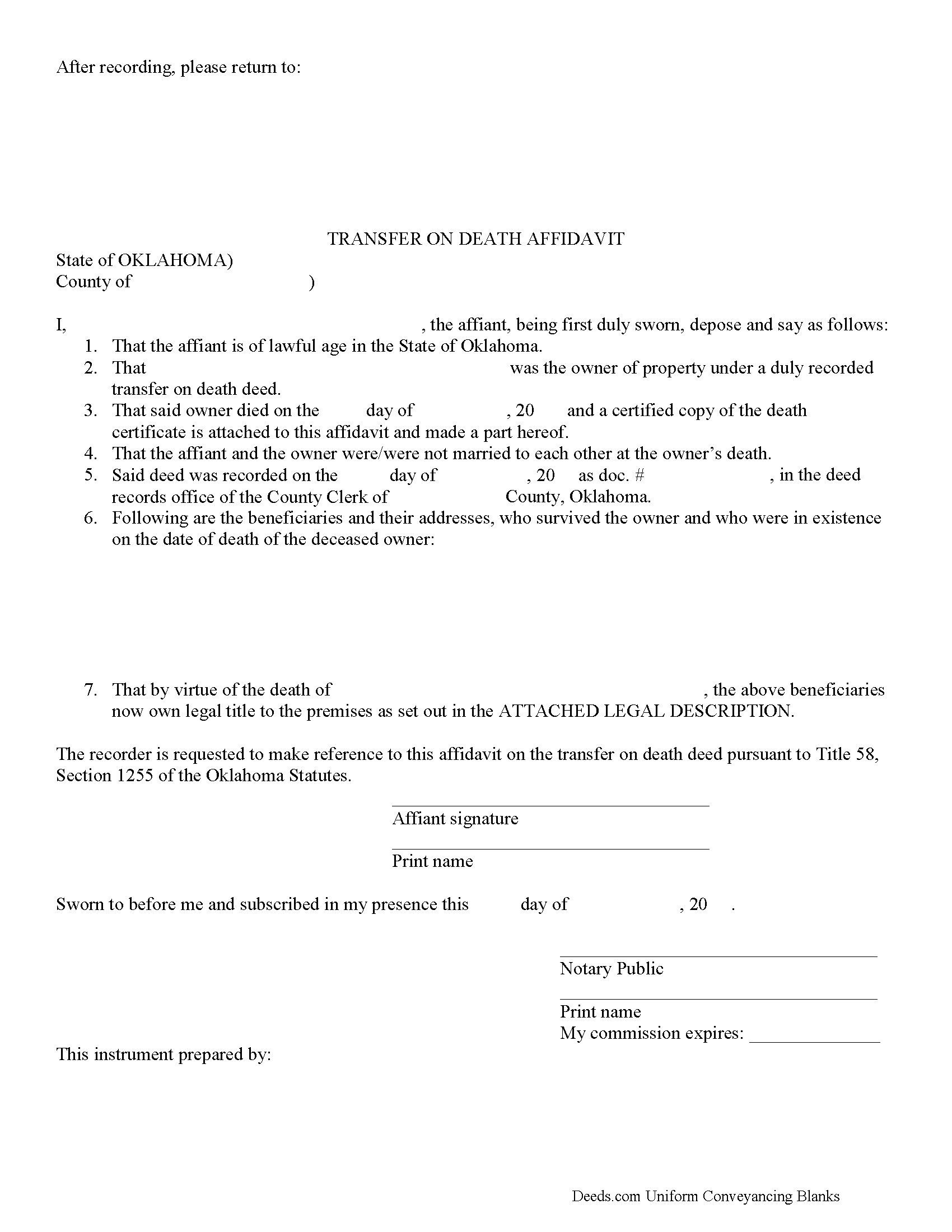
Transfer on death deeds (TODDs) in Oklahoma are governed by the Nontestamentary Transfer of Property Act (Title 58 O.S. 1251-1258), enacted in 2008. This law allows owners of interests in real property located in Oklahoma to designate one or more beneficiaries to receive those interests after the owner dies, but without the need for probate.
The statutes do not provide a specific form for completing the transfer of property rights for a recorded TODD, but they do include details about the process at 58-1252 (C), (D). To accept the property, the beneficiary must execute and record an affidavit of acceptance containing:
1. Verification of the owner's death, including a certified copy of the death certificate;
2. A statement about whether or not the owner and the beneficiary where married to each other at the time of death; and
3. A legal description of the real estate interests to be transferred.
In some cases, the beneficiary must also submit an estate tax release. Contact a tax attorney or accountant with questions about this requirement.
The affidavit and its supporting documents must be submitted to the county clerk where the land is located within nine mont... More Information about the Oklahoma Transfer on Death Affidavit of Acceptance
Affidavit of Surviving Joint Tenant
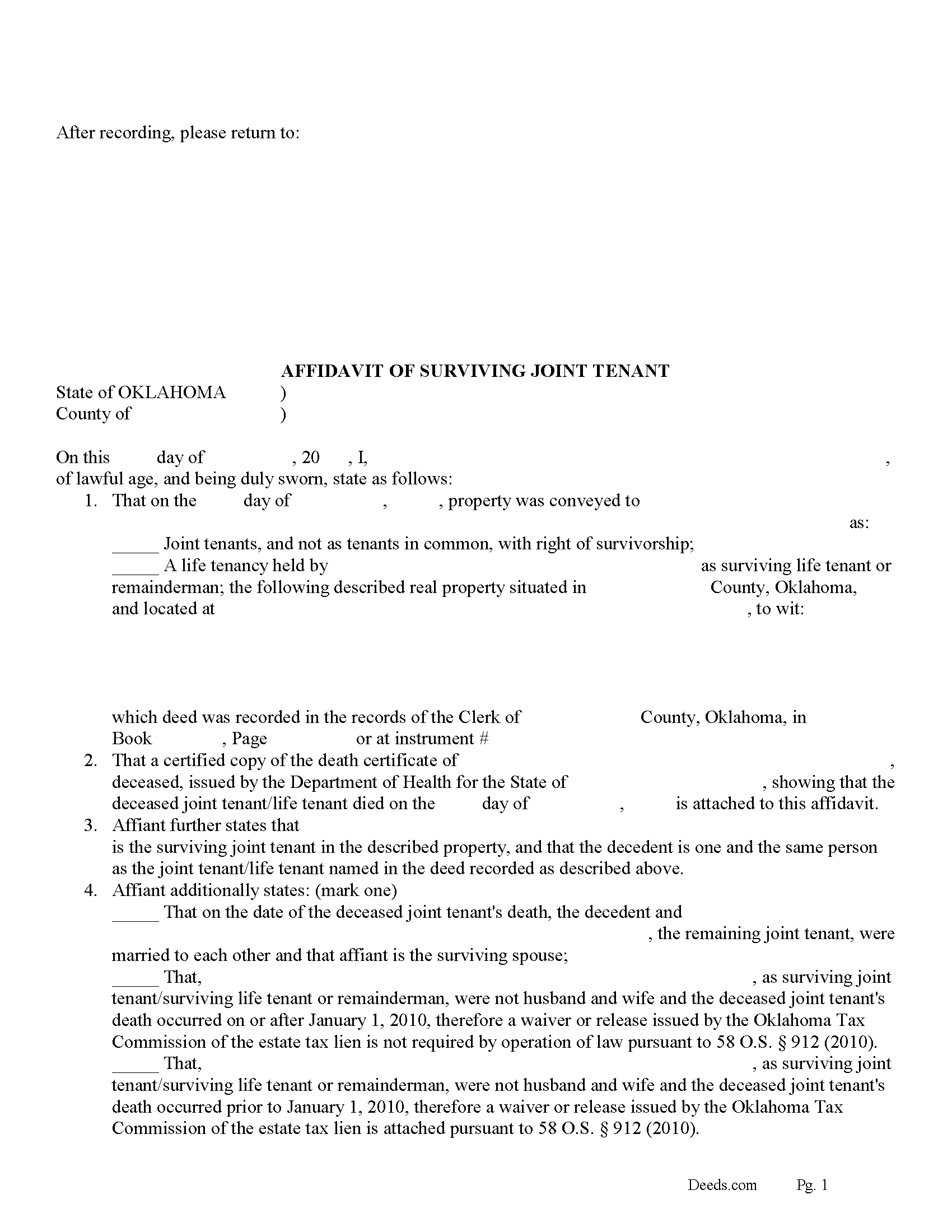
In Oklahoma, the process for transferring the title to the surviving joint tenants is governed by 58 O.R.S. 912. This section of the state laws also includes the requirements for transferring property rights to the person holding a remainder interest in a life estate.
Joint tenancy with right of survivorship is an ownership interest where two or more people share an interest in property that transfers to the remaining owner(s) when one dies. The transfer happens without probate and the property may not be included in a will.
A life estate exists when someone has the rights to use property while alive, but may not sell the property or pass the rights to anyone after death. After the life tenant dies, the rights either revert to the owner of record or to someone else who is designated on the deed to receive the remainder (remainderman). As with joint tenants, the transfer of property interest generally proceeds with no need for probate distribution.
There is no statutory affidavit form to enact these transfers separately. Instead, the affidavits customarily address both circumstances. To initiate the change in ownership, the survivor, remainderman, or an appointed represe... More Information about the Oklahoma Affidavit of Surviving Joint Tenant
Trustee Deed
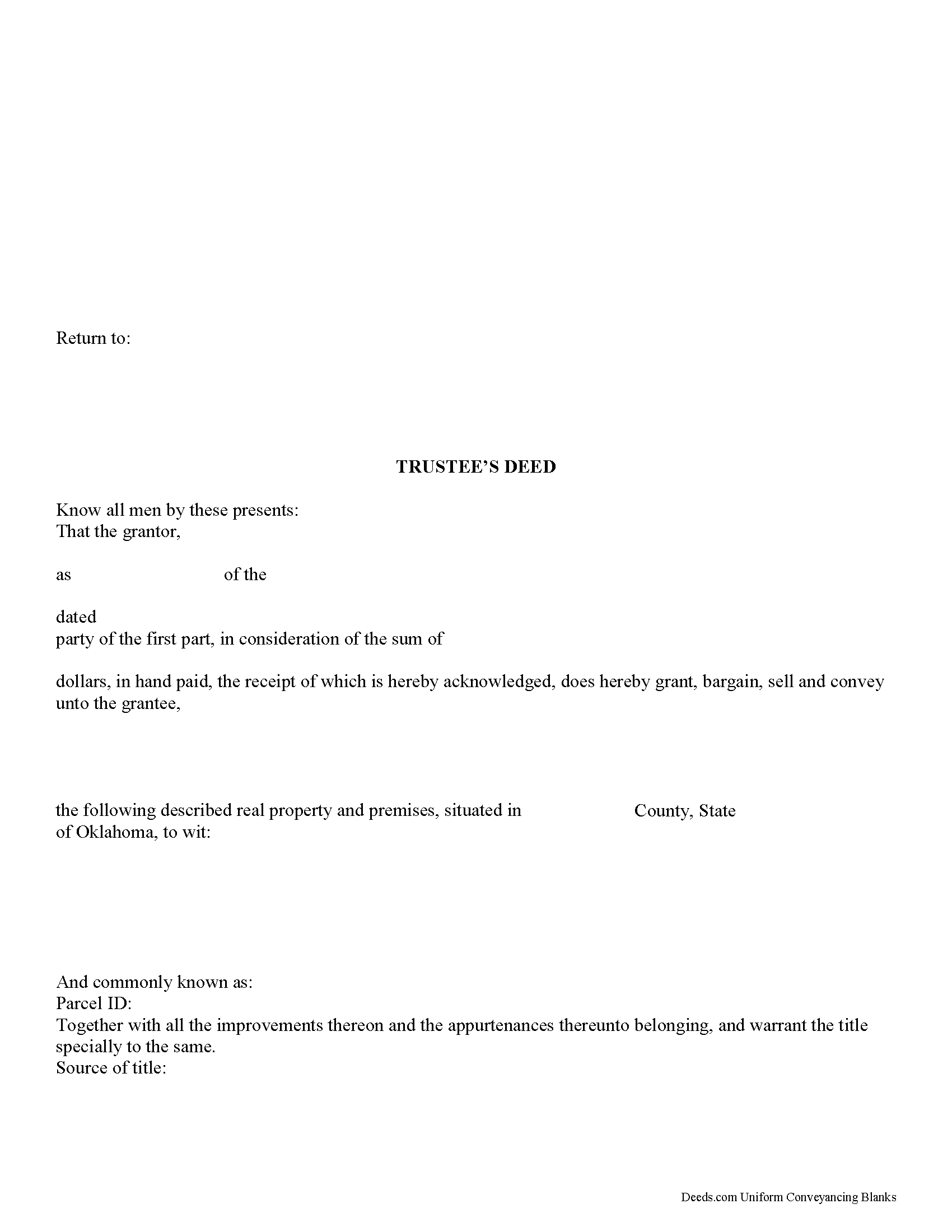
Oklahoma Conveyances of Real Property to and from Express Trusts
The Oklahoma Trust Act, codified at 60 O.S. 175.1 et seq., governs express trusts in the State of Oklahoma (60 O.S. 175.3(F)). An express trust is one "created with the settlor's express intent, usually declared in writing," and is sometimes referred to as a direct trust or declared trust.
Real property may be titled in the name of a trust, an arrangement whereby one person (the settlor; also called a trustor or grantor) conveys title to another person (the trustee) for the benefit of a third (the beneficiary). The various methods of creating a trust in Oklahoma are specified at 60 175.6, and include a transfer made during the settlor's lifetime to a trustee either for the settlor or for a third person (60 175.6(B)). In this type of trust, called an inter vivos (living) trust, the roles of settlor, trustee, and beneficiary are sometimes combined in one individual, on the condition that the settlor cannot also be the sole beneficiary (see 60 175.6(A)). Testamentary trusts, specified by a will to take effect upon the settlor's death, are another option (60 O.S. 175.3(C)).
In Oklahoma, a trust containing ... More Information about the Oklahoma Trustee Deed
Personal Representative Deed Power of Sale
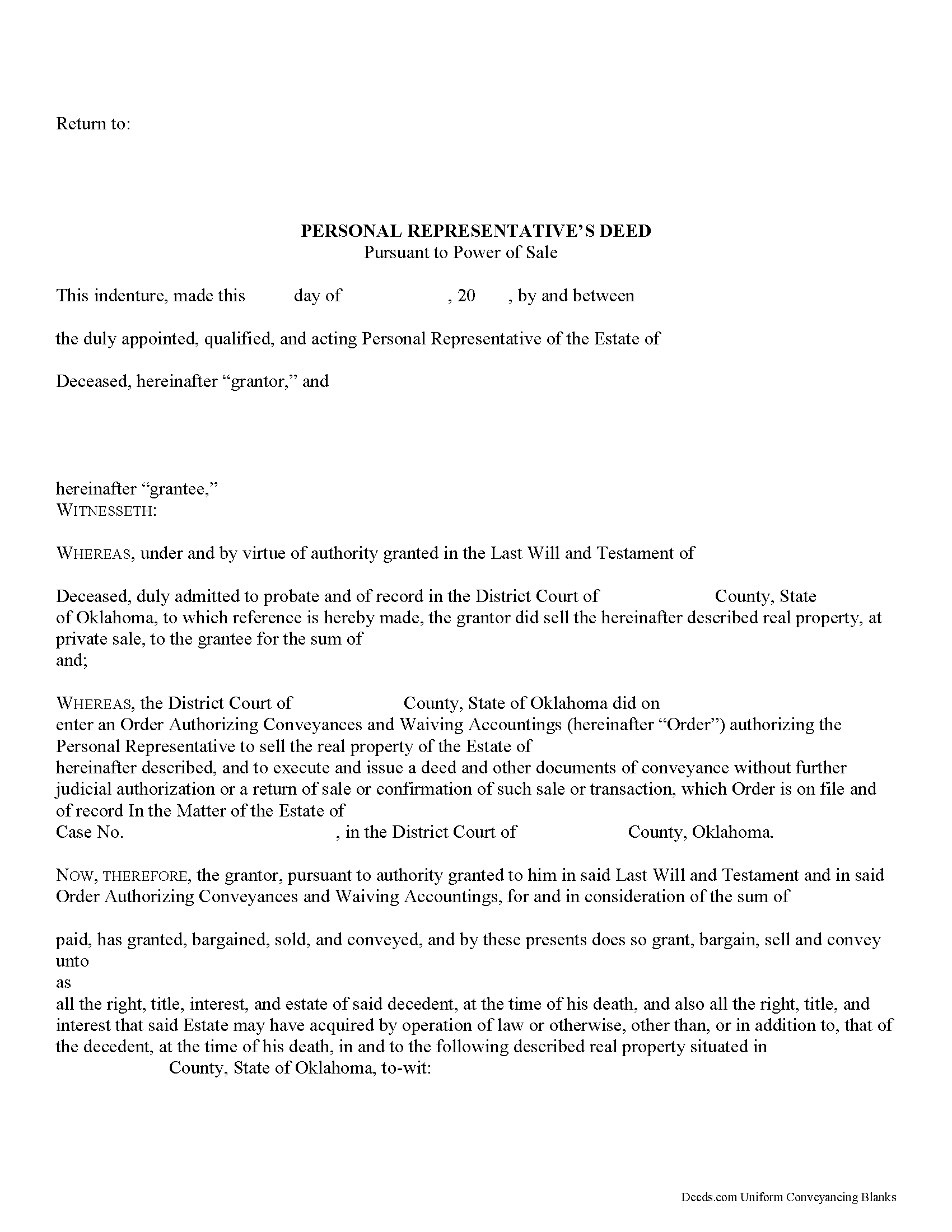
A personal representative's deed given under the power of sale is a probate deed, and one of several fiduciary instruments that may be used in estate administration. This deed is required when the personal representative is directed to sell property by a decedent's will. It can only be used by PRs of a testate estate. The personal representative's (PR) deed is named after the capacity of the granting party.
In some cases, the decedent's will may have authorized or explicitly directed a sale of realty by granting the executor (the PR named in a decedent's will) a power of sale. Before a deed can be recorded, the district court must authorize the sale and conveyance. The PR must apply to the court for an Order Authorizing Conveyances and Waiving Accountings.
Following such an order from the district court, use a personal representative's deed to transfer an interest in real property from a probate estate to a purchaser at private sale. The deed conveys all the right, title, interest, and estate of the decedent at the time of his death.
In addition to meeting all state and local standards for recorded documents, components of a properly executed PR deed include the recital o... More Information about the Oklahoma Personal Representative Deed Power of Sale
Personal Representative Deed of Distribution
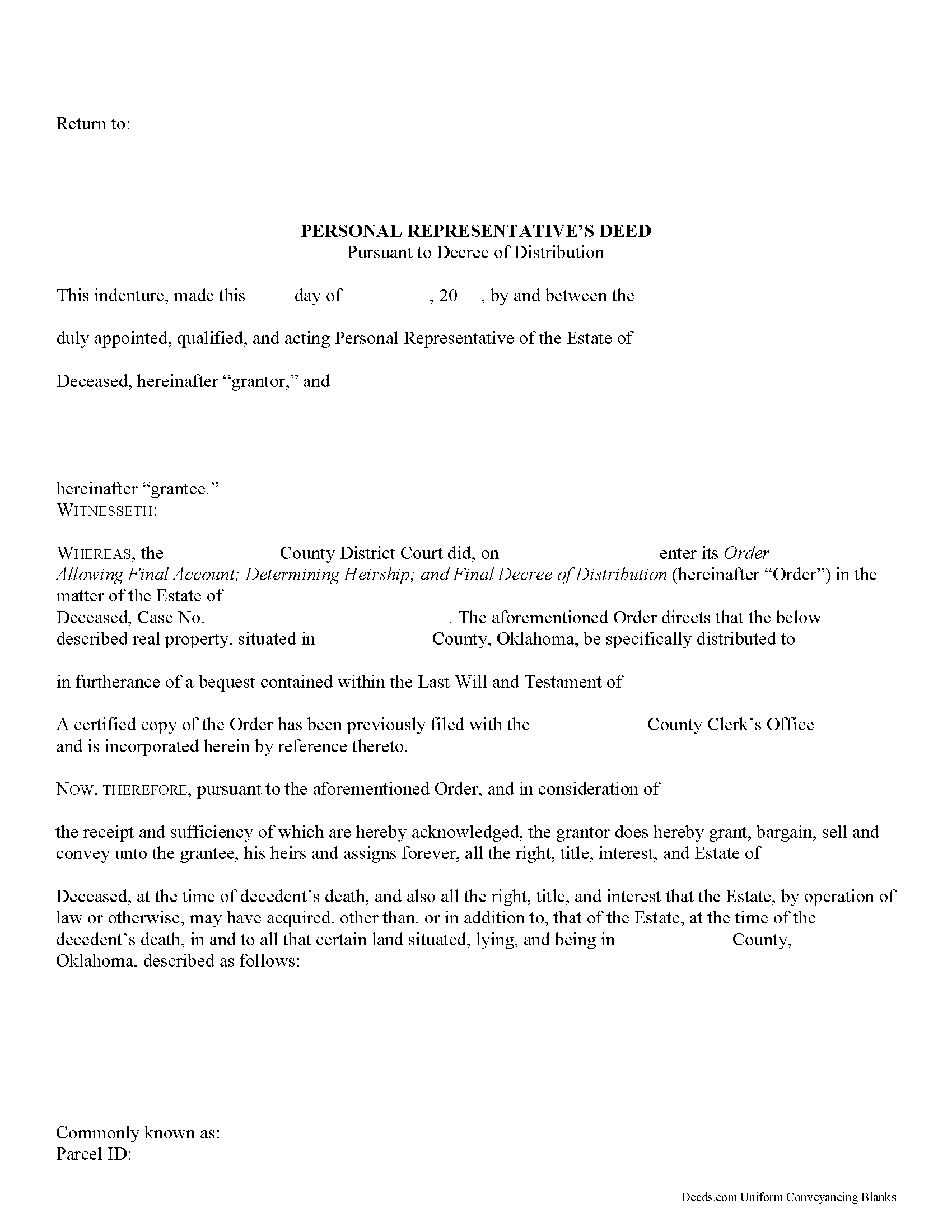
A personal representative's deed pursuant to a decree of distribution is a probate deed and one of several fiduciary instruments that may be used in estate administration. The personal representative's (PR) deed is named after the capacity of the granting party.
Following an Order Allowing Final Account; Determining Heirship; and Final Decree of Distribution from the district court, use a personal representative's deed of distribution to transfer an interest in real property to a distributee of an estate with no consideration. The deed conveys all the right, title, interest, and estate of the decedent at the time of his death.
When signed by the PR, acknowledged in compliance with 16 O.S. 33, and recorded in the appropriate county register of deeds' office, the deed titles the subject property in the grantee's name and ensures an accurate chain of title following the owner's death. The grantee of a deed of distribution may be a devisee named in a decedent's will to inherit real property, or an heir at law, as determined by the Oklahoma statute of descent and distribution (84 O.S. 213).
In addition to meeting all state and local standards for recorded documents, components... More Information about the Oklahoma Personal Representative Deed of Distribution
Personal Representative Deed of Sale
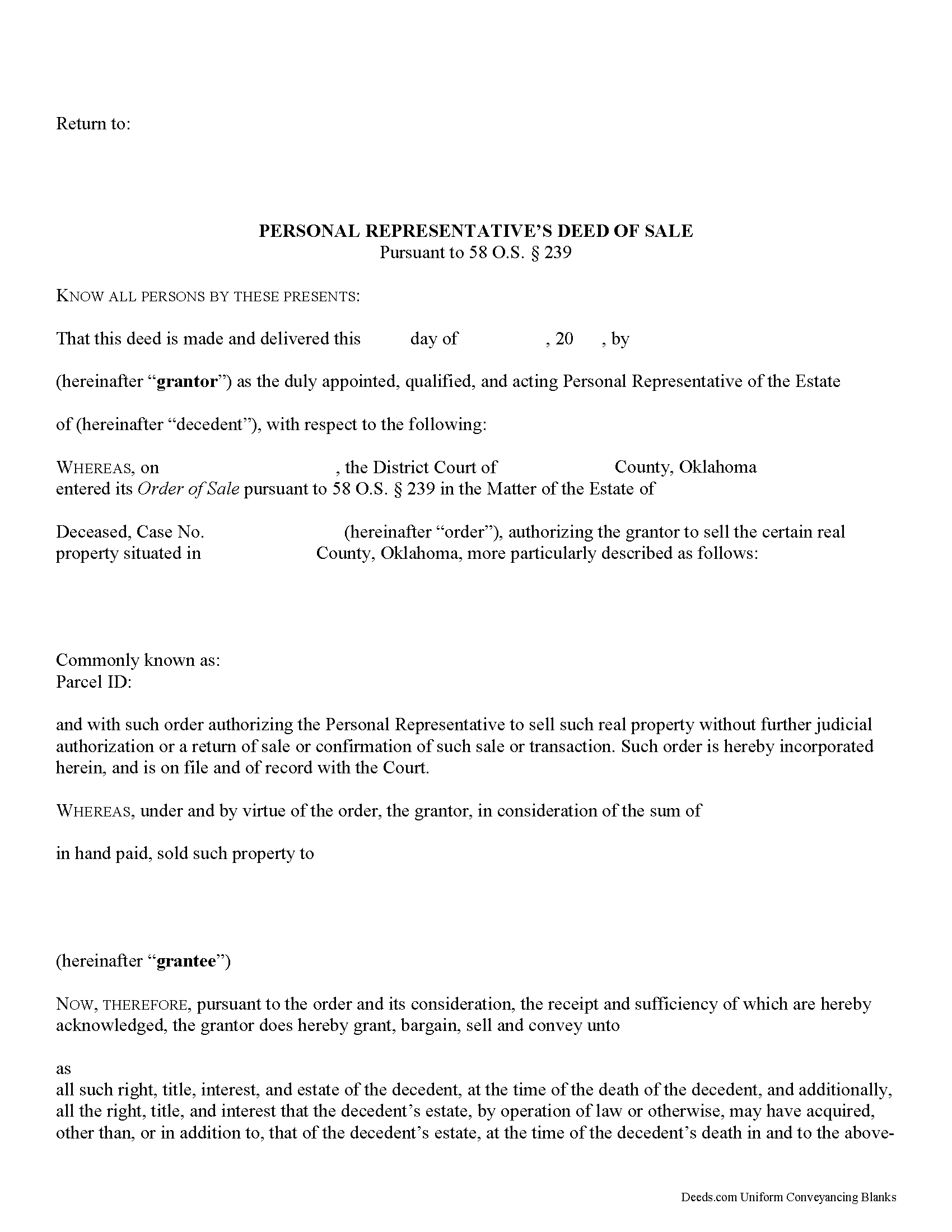
A personal representative's deed given under 58 O.S. 239 is a probate deed, and one of several fiduciary instruments that may be used in estate administration. This deed conveys title in situations where the debts of the estate require the sale to convert assets to cash. The personal representative's (PR) deed is named after the capacity of the granting party.
Before a personal representative can execute and record a deed, the sale and conveyance must be authorized by the district court. The PR must apply to the court for an Order Authorizing Sale of Real Property Pursuant to 58 O.S. 239.
Following an order of sale from the district court, use a personal representative's deed to transfer an interest in real property from a probate estate to a purchaser at public or private sale. The deed conveys all the right, title, interest, and estate of the decedent at the time of his death.
In addition to meeting all state and local standards for recorded documents, components of a properly executed PR deed of sale given under 58 O.S. 239 include the recital of probate details, including the name of the court-appointed personal representative, the decedent's name, the date of the ord... More Information about the Oklahoma Personal Representative Deed of Sale
Preliminary Notice
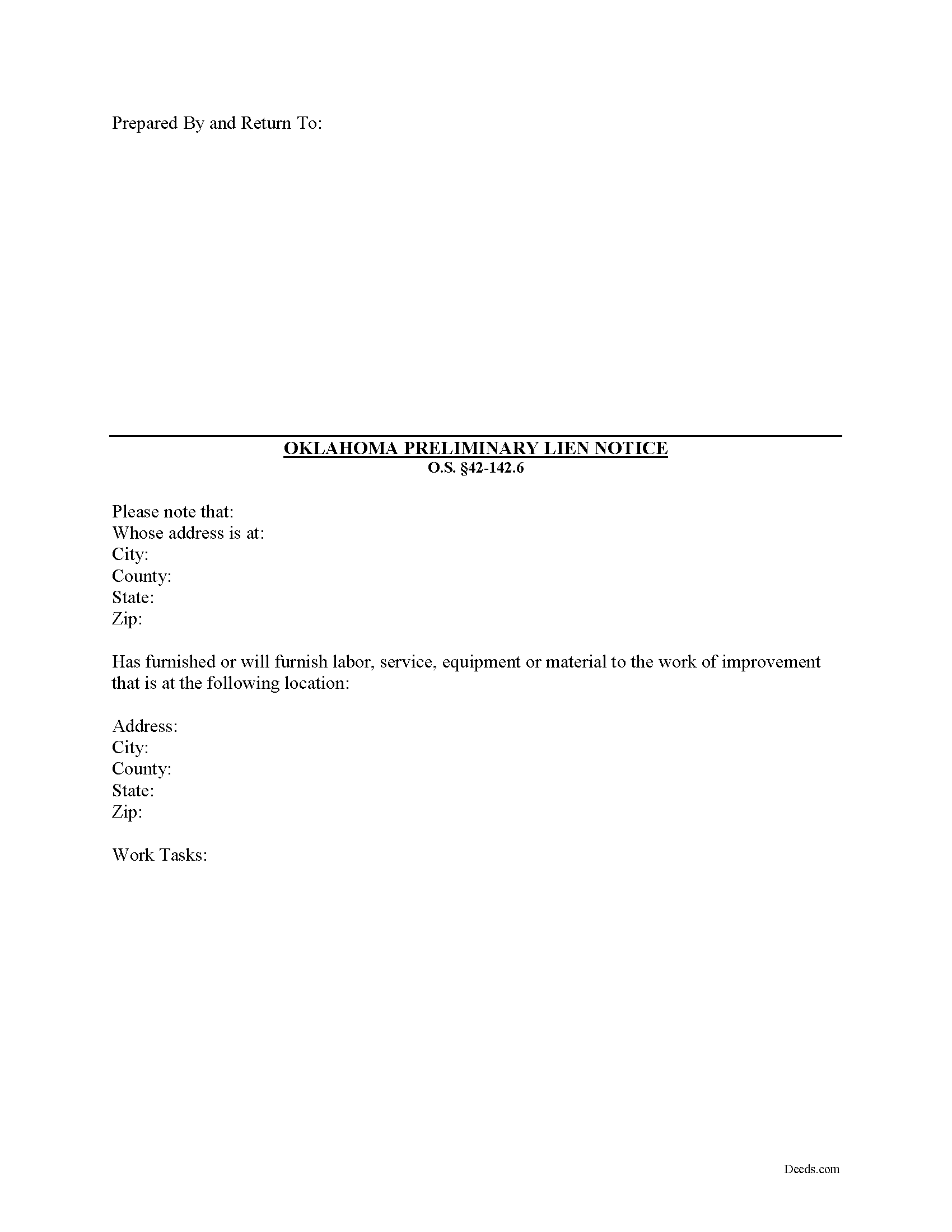
Many states, including Oklahoma, mandate that a contractor, subcontractor, or other service provider first serve a preliminary notice on a property owner in order to preserve the rights to claim a mechanic's lien. The purpose of such notice is to make the owner aware of the parties involved in their construction job, which in turn protects the property from any "hidden liens" filed claimants who later come out of the woodwork. As is often the case in construction jobs, contractors employ persons below them who could have a lien claim even if the owner paid the first contractor in full.
In Oklahoma, prior to filing a lien statement, no later than seventy-five (75) days after the last date of supply of material, services, labor, or equipment in which the claimant is entitled or may be entitled to lien rights, the claimant must send to the last-known address of the original contractor and an owner of the property a pre-lien notice. O.S. 142.6(B)(1). No lien affecting property occupied as a dwelling by an owner will be valid unless the pre-lien notice was sent within seventy-five (75) days of the last furnishing of materials, services, labor or equipment by the claimant. Id.
Th... More Information about the Oklahoma Preliminary Notice
Claim of Mechanics Lien
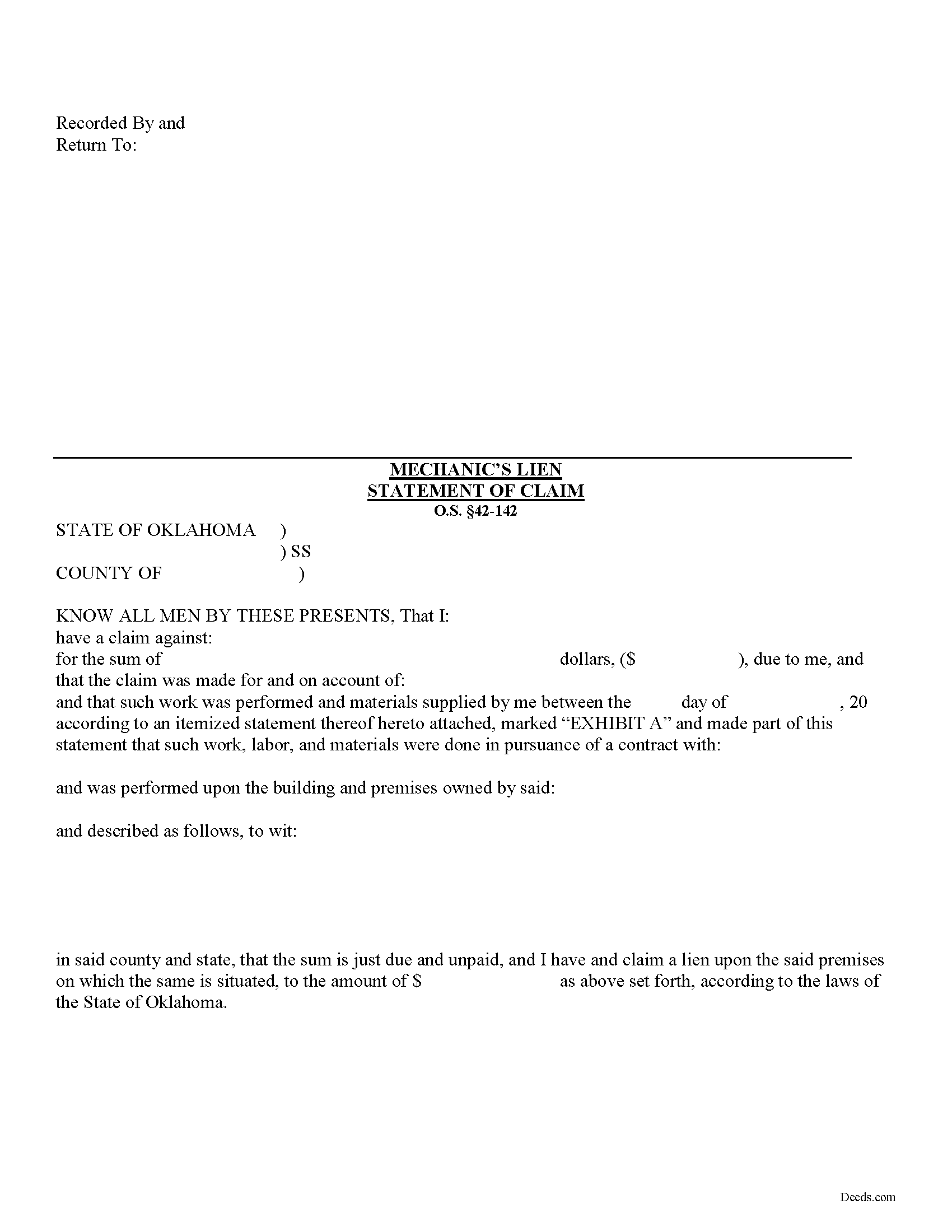
Claiming an Oklahoma Mechanic's Lien
Mechanic's liens provide a form of security of payment to builders, contractors, and other parties working on a construction job. Suppliers of materials, subcontractors and persons delivering materials can also claim a lien. A mechanic's lien works by making it harder for the owner to sell or refinance the property without first paying off the underlying lien. It also gives the person holding the lien the right to foreclose, or force a sale of the property to recover the money owed.
In Oklahoma, any person claiming a lien must file in the county clerk's office of the county in which the land is situated a statement setting forth the amount claimed and the items claimed including the names of the owner, the contractor, the claimant, and a legal description of the property subject to the lien, verified by affidavit. O.S. 42-142.
The statement must be filed within four (4) months after the date upon which material or equipment used on the land was last furnished or labor was last performed under a contract. Id. If the claim is made for the planting of any trees, vines, plants, or hedge, then the statement must be filed within four (4) mon... More Information about the Oklahoma Claim of Mechanics Lien
Affidavit of Cancellation of Lien
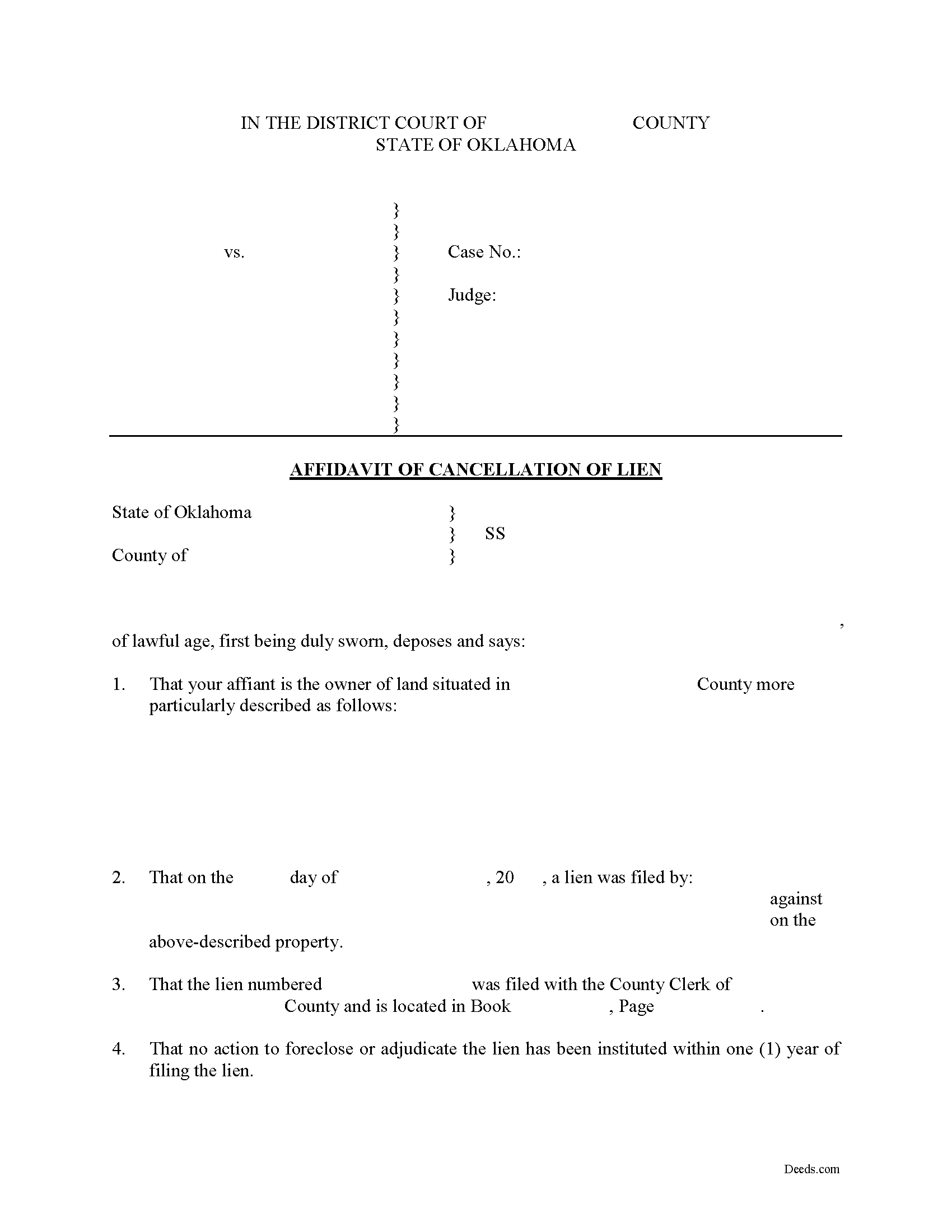
Liens are pesky creatures and if your property is plagued by one, you probably are looking for methods to remove it. Sometimes liens can be erroneously placed on your property or the claimant neglects to ever enforce the lien. Therefore, by filing an Affidavit of Lien Cancellation, you swear to the court that the facts behind the lien justify its cancellation.
If any lien is filed, and no action to foreclose the lien has commenced, the owner of the land may file a petition in the district court of the county in which the land is situated, naming the lien claimants as defendants, and requesting the court for an decision of the lien, and if the lien claimant fails establish a lien, the court may tax against the claimant the whole, or a portion of the costs of the action as may be just. O.S. 42-177.
Liens also can be cancelled by becoming time-barred. If no action to foreclose or settle the lien is filed within one (1) year from the filing of the lien, the lien is canceled by limitation of law. Id. If a lien is canceled by limitation of law, the owner of the land may file an affidavit proving its cancellation with the county clerk of the county in which the land is located. Id.... More Information about the Oklahoma Affidavit of Cancellation of Lien
Notice of Bond to Discharge Lien
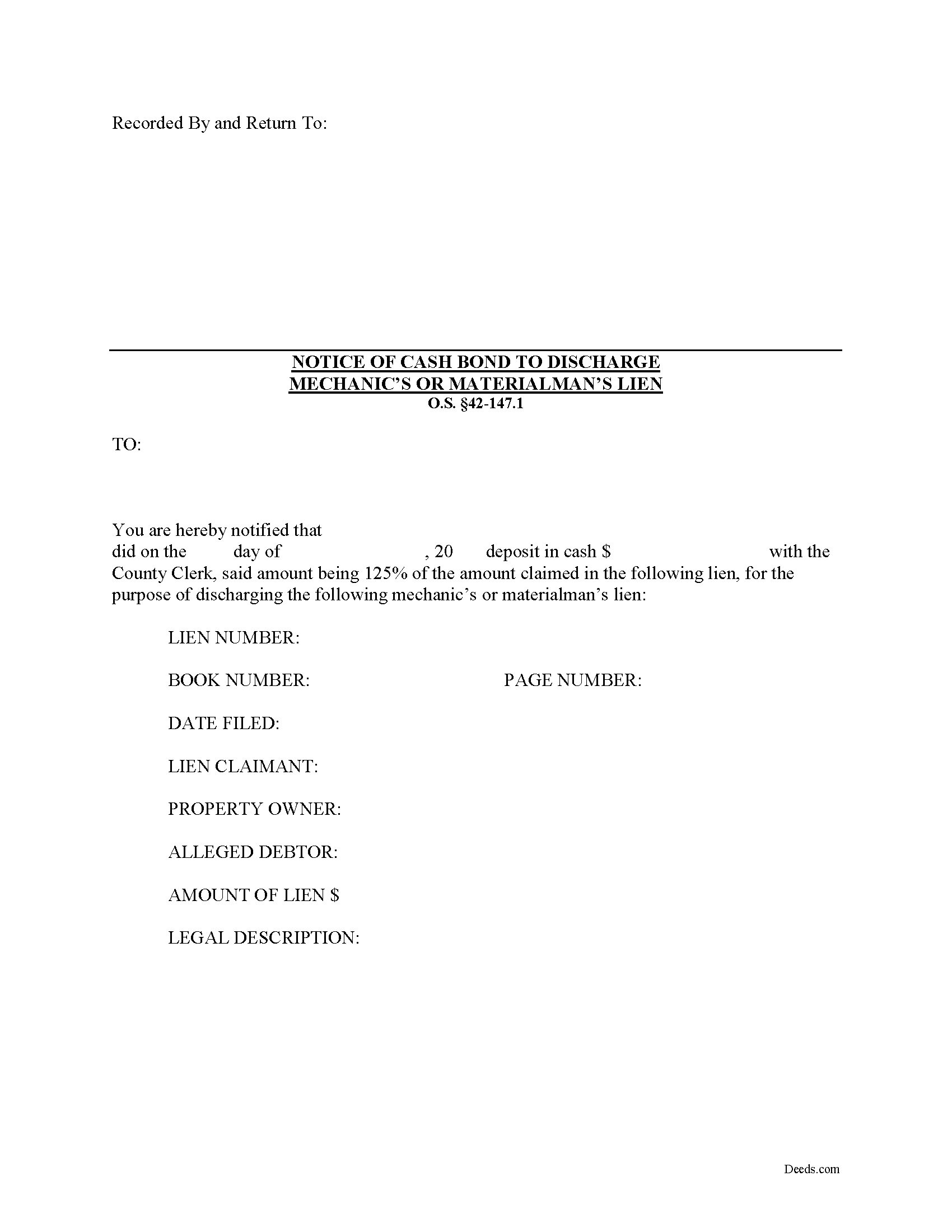
Discharging an Oklahoma Lien by Posting Bond
Property owners feel a strong motivation to prevent and remove any liens from their land. Liens interfere with ownership interests and can interfere with obtaining refinancing, selling property, or using it as collateral for a loan. Therefore, in order to remove or prevent a lien from being placed on your land, owners may deposit a bond as security. The bond lets the lien claimant know that a lien won't be necessary because the bond is available if payment ever becomes an issue.
Any property owner or other interested party, including but not limited to mortgagees, contractors, subcontractors and others against whom a lien claim is filed under the provisions of the law relating to mechanics' and materialmen's liens, may at any time discharge the lien by depositing with the county clerk in whose office the lien claim has been filed either: an amount of money equal to one hundred twenty-five percent (125%) of the lien claim amount; or a corporate surety bond with a penal amount equal to one hundred twenty-five percent (125%) of the lien claim amount. O.S. 42-147.1.
Within three (3) business days after the deposit of money or bond... More Information about the Oklahoma Notice of Bond to Discharge Lien
Release of Mechanic Lien
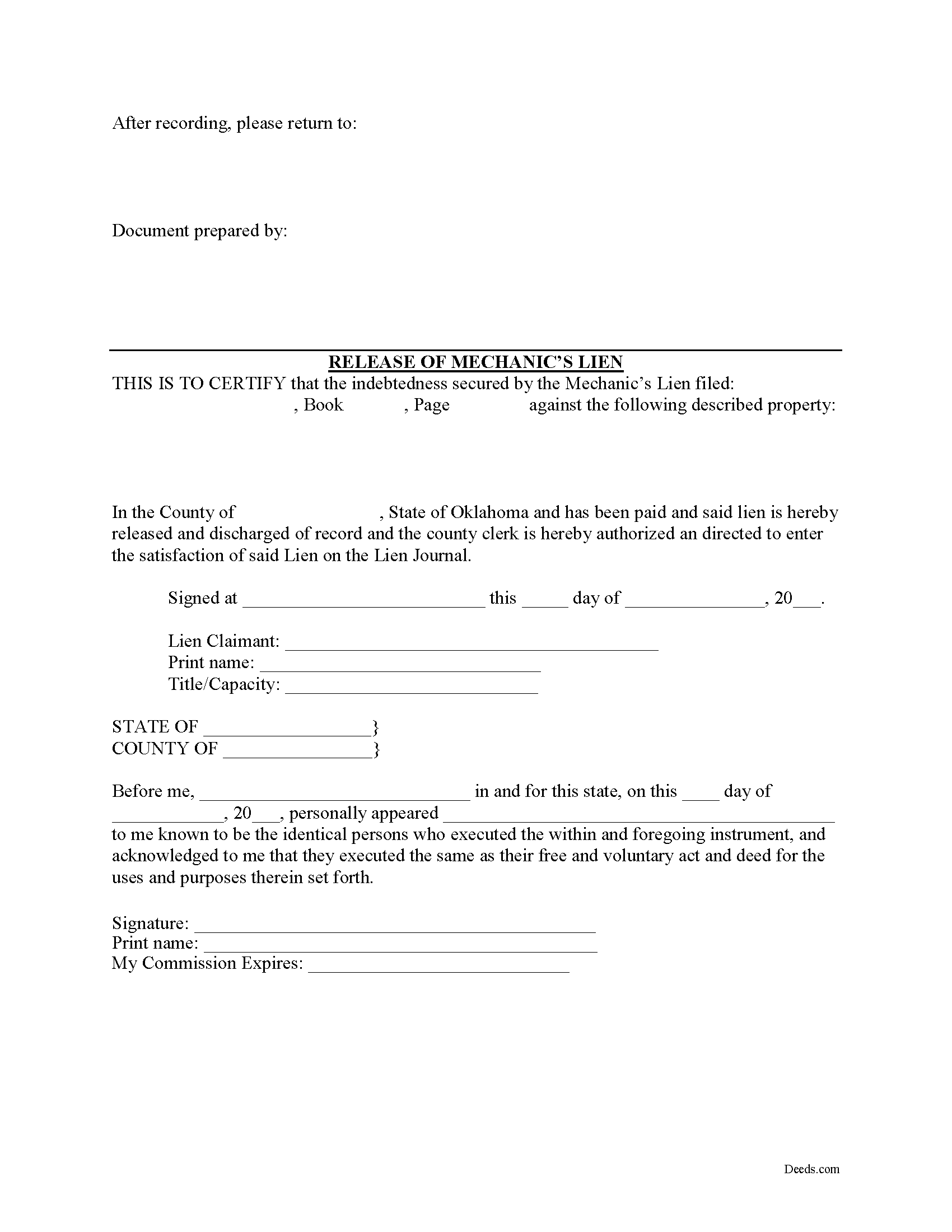
Releasing a Mechanic's Lien in Oklahoma
Liens that expire or are otherwise no longer valid must be released. In order to release property from a mechanic's lien, a lien release form needs to be executed. There is no statutory lien release form, although under principles of contract law and the potential for civil damages caused by the lien, a lien claimant should release property when the lien is no longer justified.
In Oklahoma, the lien claimant must execute a form stating the lien has been paid off and should therefore be released and discharged from the record by the county clerk. The clerk is then authorized and directed to enter the satisfaction of the Lien onto the Lien Journal.
This article is provided for informational purposes only and should not be relied upon as a substitute for the advice from a legal professional. If you have questions about releasing a lien, or any other issues related to liens in Oklahoma, please contact an attorney.... More Information about the Oklahoma Release of Mechanic Lien
Request for Waiver of Lien
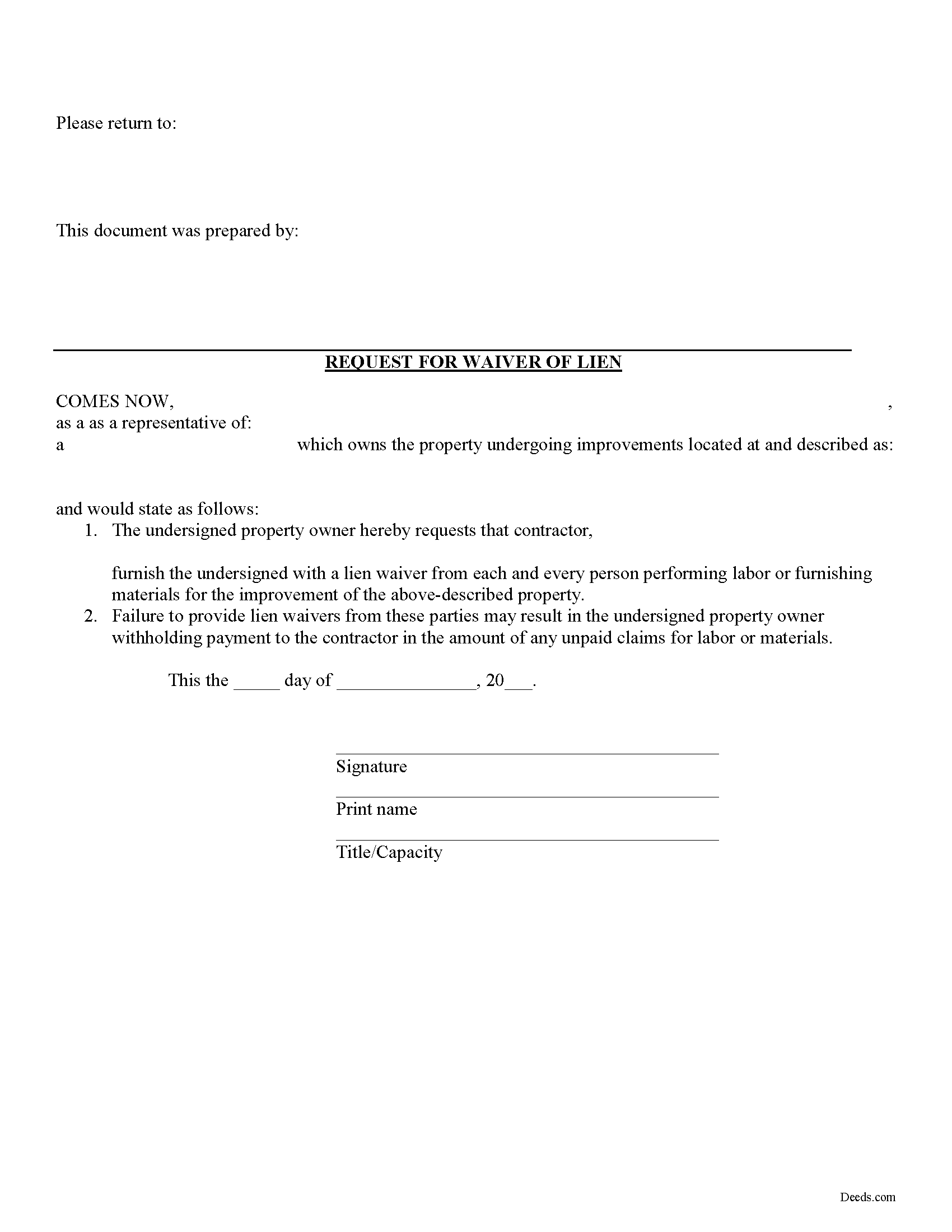
Requesting a Lien Waiver in Oklahoma
Sometimes it's necessary for a property owner to request a lien waiver from a contractor in exchange for paying the contractor any amount owed. With a waiver, contractors agree to give up their rights to file a lien against the title for any outstanding balance due.
A property owner may request that a contractor provide the owner with a lien waiver from each and every person who performed labor or furnished materials for the improvement of the property. The request form identifies the parties, the project's location, and relevant dates. Deliver the request via a US Mail service with delivery confirmation.
Failure to provide lien waivers from these parties may allow the property owner to withhold payment to the contractor in the amount of any unpaid claims for labor or materials.
This article is provided for informational purposes only and should not be relied upon as a substitute for the advice from a legal professional. Please contact an Oklahoma attorney with any questions about requesting a lien waiver from a contractor.... More Information about the Oklahoma Request for Waiver of Lien
Mechanics Lien Waiver
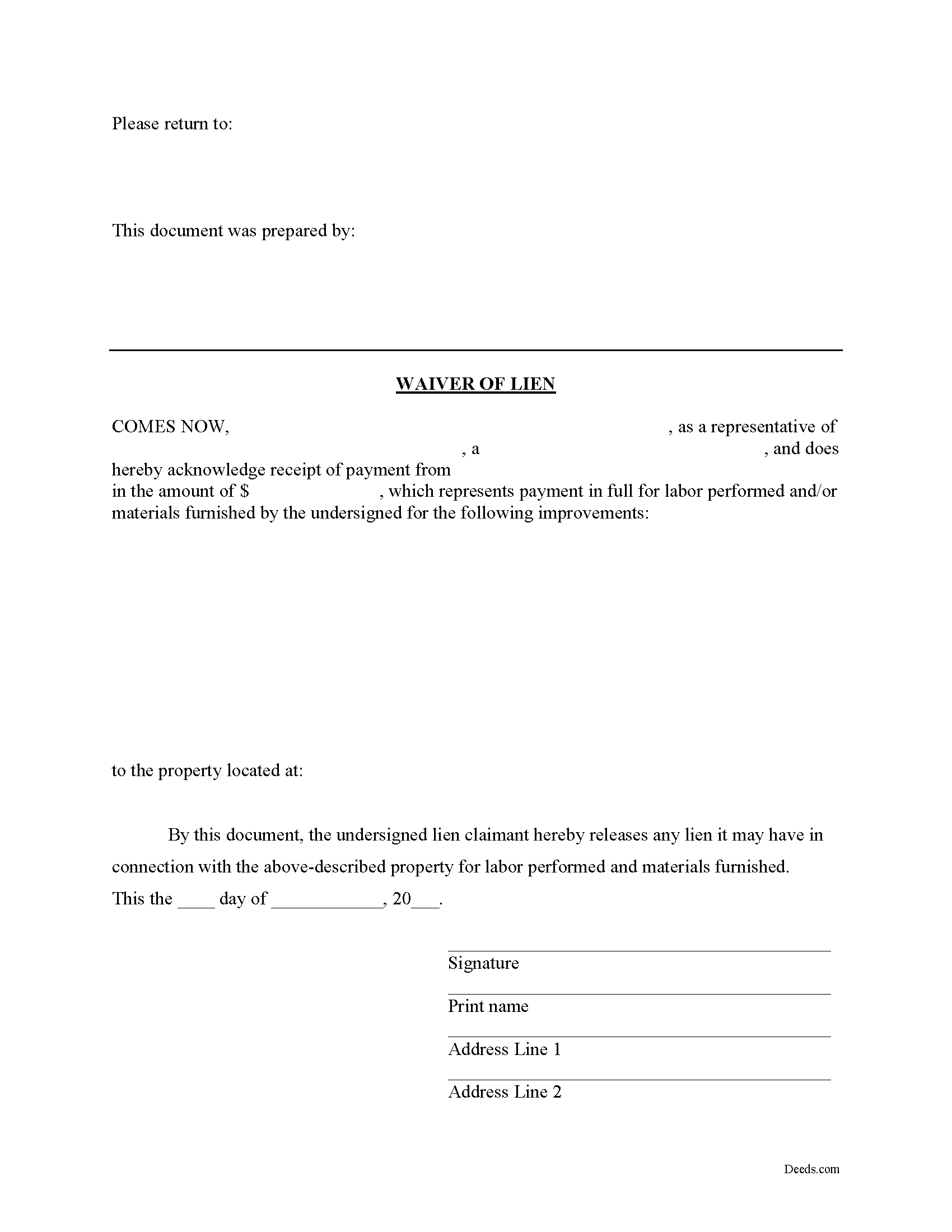
Waiving a Mechanic's Lien in Oklahoma
Lien waivers are used to preemptively give up lien rights in exchange for inducing a payment. In Oklahoma, the legislature has not provided for any required form of a lien waivers, so common law principles of contract allow for the parties to use a form that suits their needs, as long as purpose of the document (waiving a lien) is made clear.
The lien waiver form contains information about the lien claimant, property owner, amount of payment, and a description of the labor or materials furnished. Once the document is signed and recorded, lien rights are waived in accordance with the payment amount. Therefore, it is of vital importance to verify that payment has been made before signing any lien waiver.
This article is provided for informational purposes only and should not be relied upon as a substitute for the advice from a legal professional. If you have questions about using a lien waiver, or any other issues related to liens in Oklahoma, please consult with an attorney.... More Information about the Oklahoma Mechanics Lien Waiver
Request for List
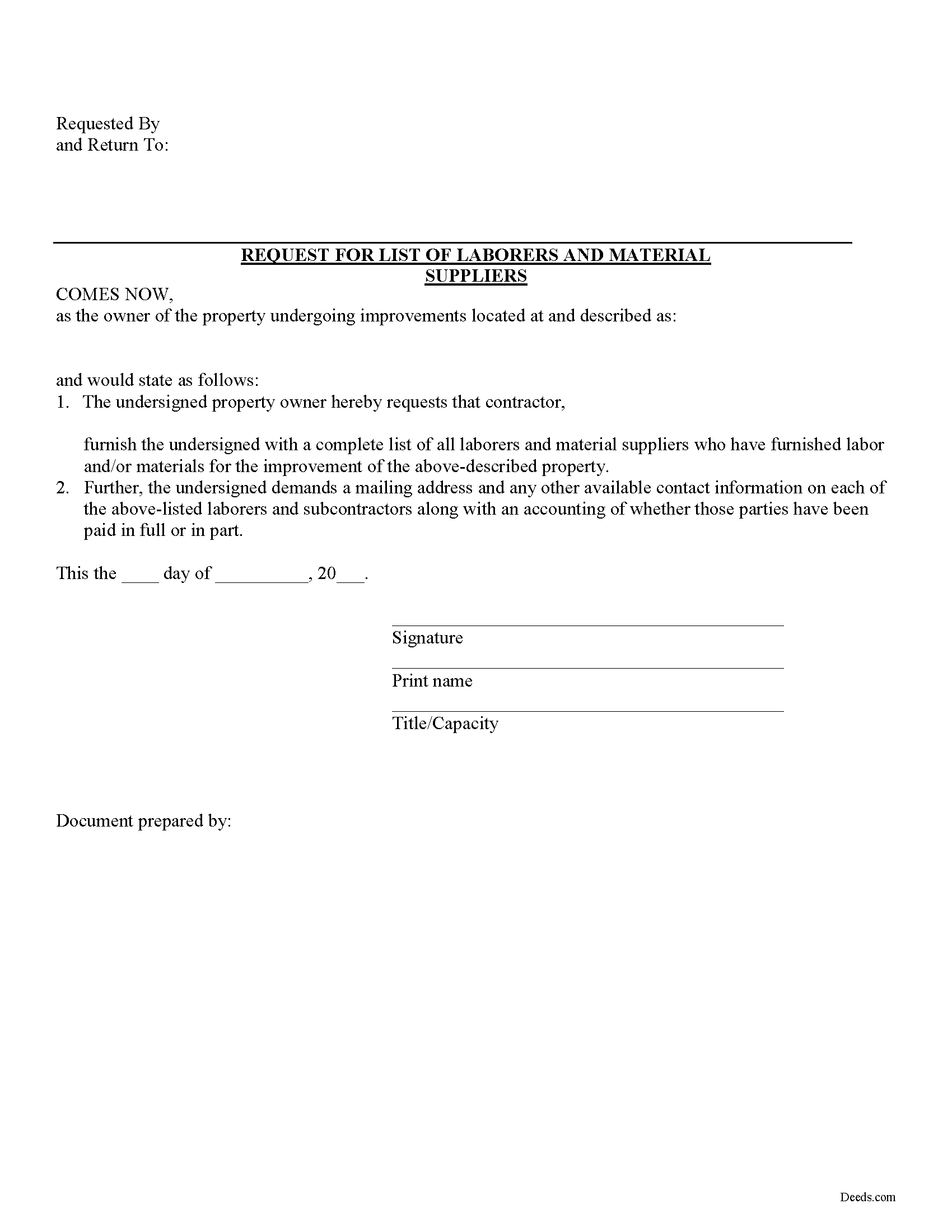
Requesting a List of Laborers and Material Suppliers in Oklahoma
As a property owner, it's important to get a sense of who is involved in a construction or improvement job on your land because some of these individuals might have eventual lien rights. It's always a headache to deal with a mechanic's lien levied by a subcontractor or other supplier you never even had contact with, even more when you paid your contractor in full.
Sending the contractor a request for a list of laborers and material suppliers requires the contractor to provide a complete list of all laborers and material suppliers who have furnished labor and/or materials for the improvement of the property. The form also demands a mailing address and any other available contact information from each of the laborers and subcontractors along with an accounting of whether those parties have been paid in full or in part. Id. That way, if you discover parties that are unpaid, you can withhold that appropriate payment from the contractor to protect yourself from any lien.
This article is provided for informational purposes only and should not be relied upon as a substitute for the advice from a legal professional.... More Information about the Oklahoma Request for List
Disclaimer of Interest
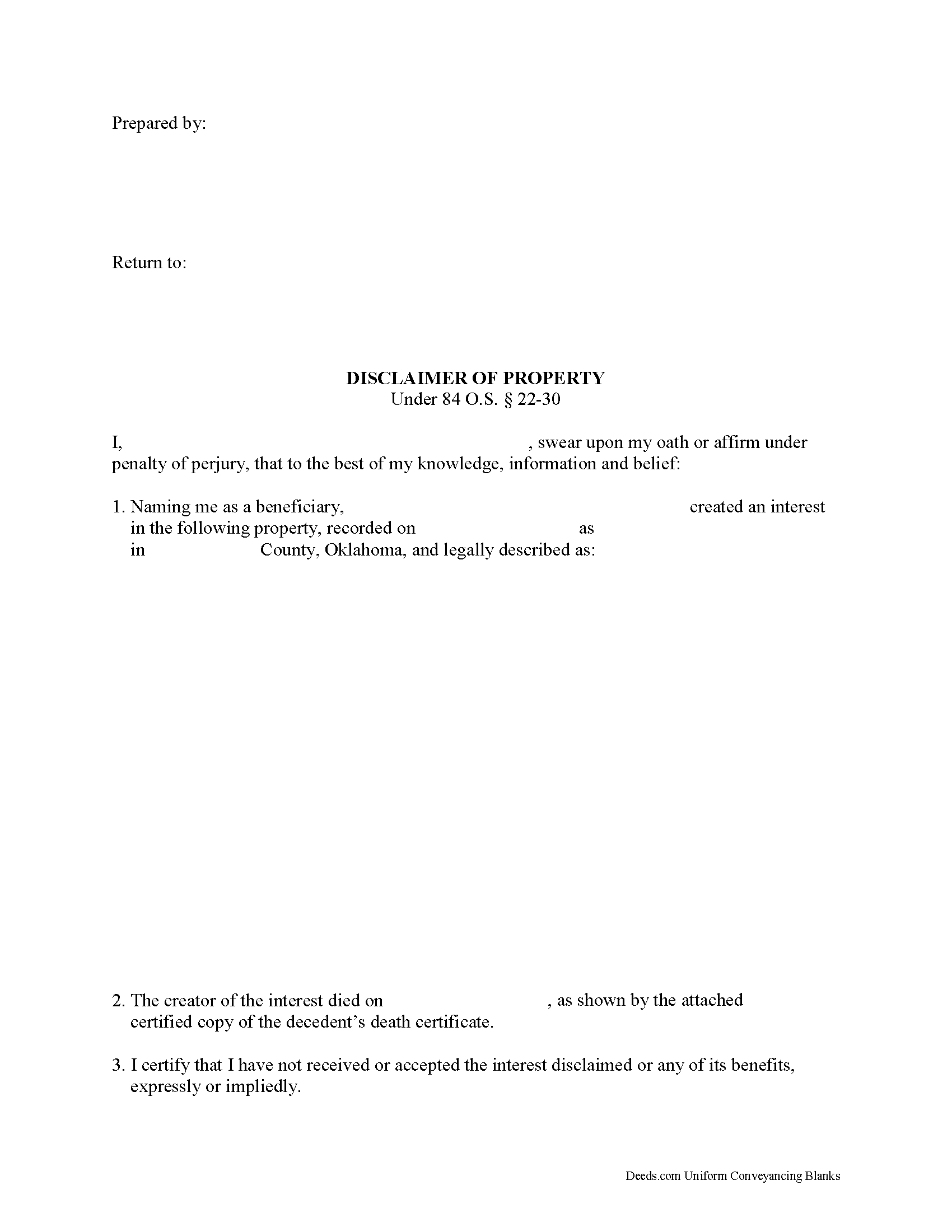
Oklahoma Disclaimer of Property - Description
Under the Oklahoma statutes, the beneficiary of an interest in property may renounce the gift, either in part or in full (84 O.S. 22-30). Note that the option to disclaim is only available to beneficiaries who have not acted in any way to indicate acceptance or ownership of the interest.
The disclaimer must be in writing and include a description of the interest, a declaration of intent to disclaim all or a defined portion of the interest, and be signed by the disclaimant.
File the disclaimer within nine months of the transfer (e.g., the death of the creator of the interest) with the district court having jurisdiction over the estate and deliver a copy of it to the representative, trustee, or other person holding legal title of the property. In the case of real property, record the original disclaimer, or a copy certified by the clerk of the district court, in the office of the county clerk in the county (or counties) where the real estate is situated (84 O.S. 24-25).
A disclaimer is irrevocable and binding for the disclaiming party and his or her creditors, so be sure to consult an attorney when in doubt about the draw... More Information about the Oklahoma Disclaimer of Interest
Memorandum of Trust
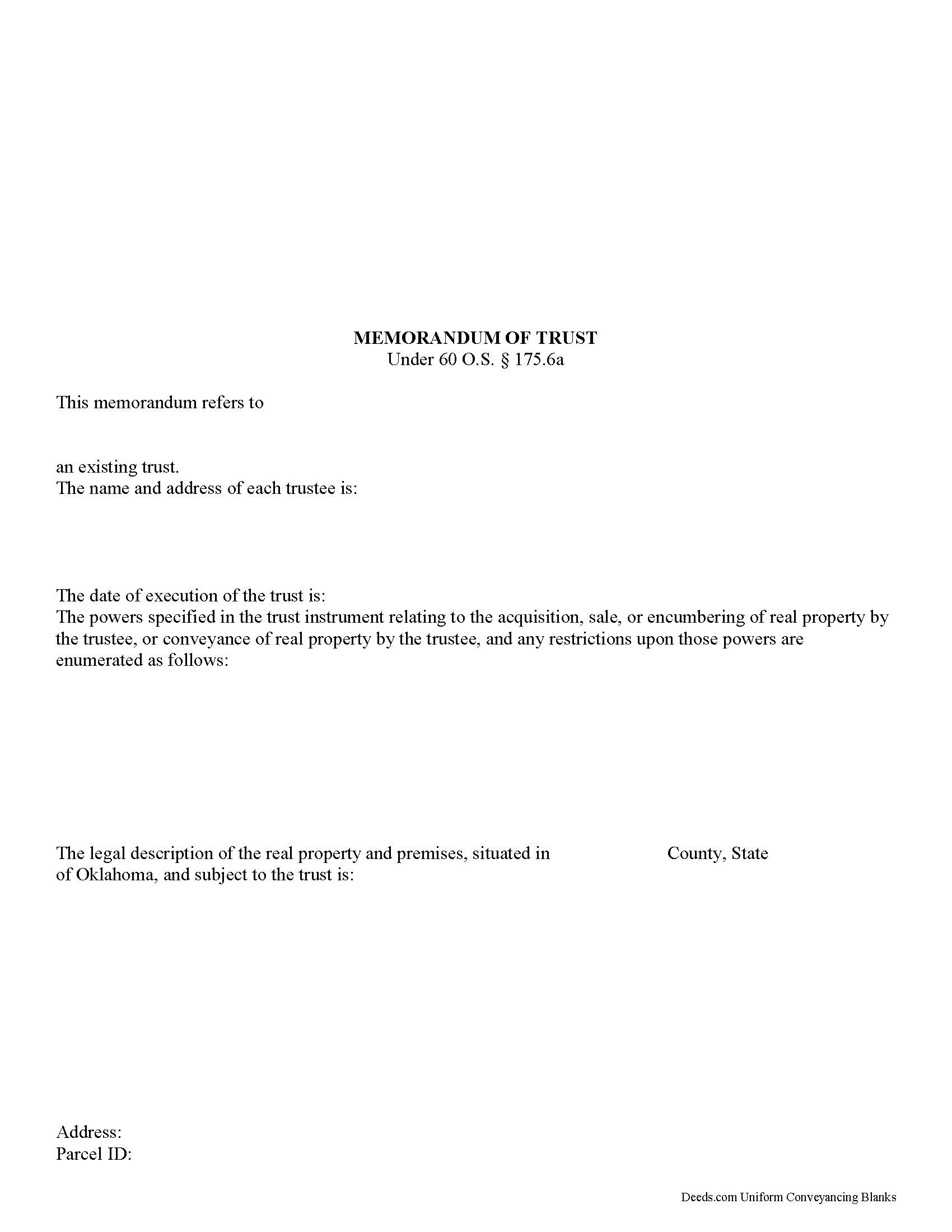
In Oklahoma, the memorandum of trust is codified at 60 O.S. 175.6a. Executed by a trustee, the memorandum of trust is a recorded document pertaining to real property acquisitions and transfers by an express private trust.
An express private trust refers to any trust that is "created with the settlor's express intent, usually declared in writing," and is not a business trust [1]. In a trust arrangement, a settlor conveys property to another person (the trustee) to be held for a third (the beneficiary). The trust is administered pursuant to the terms of a written document executed by the settlor. This document, called the trust instrument, designates the trustee and trust beneficiaries and outlines the provisions of the trust and the scope of the trust's assets. In some cases, the trust instrument may be recorded, but it is generally a private document.
In lieu of providing parties outside of the trust arrangement with the full trust instrument, a trustee may provide a memorandum when entering into real property transactions. The memorandum is an abstract of the trust instrument that is recorded when the trust acquires real property or when the trustee is conveying real prop... More Information about the Oklahoma Memorandum of Trust
Lis Pendens - Notice of Pending Suit
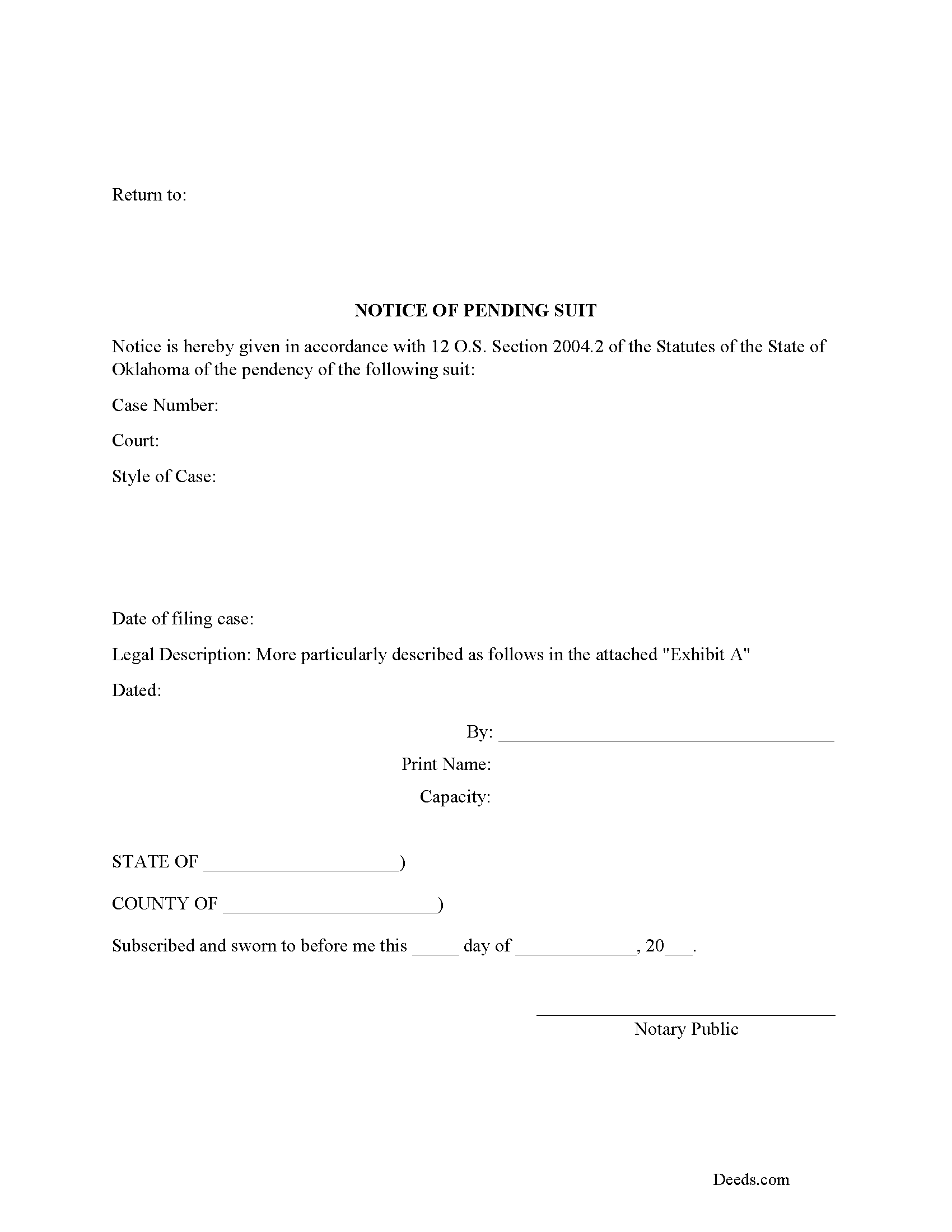
The Lis Pendens/Notice of Pending Action becomes effective when filed in the in the (Office of the County Clerk of the) Oklahoma (county wherein the land is situated), Providing constructive notice that a suit is pending. 12-2004.2
(Oklahoma Notice of LP Package includes form, guidelines, and completed example) For use in Oklahoma only.... More Information about the Oklahoma Lis Pendens - Notice of Pending Suit
Mineral Deed
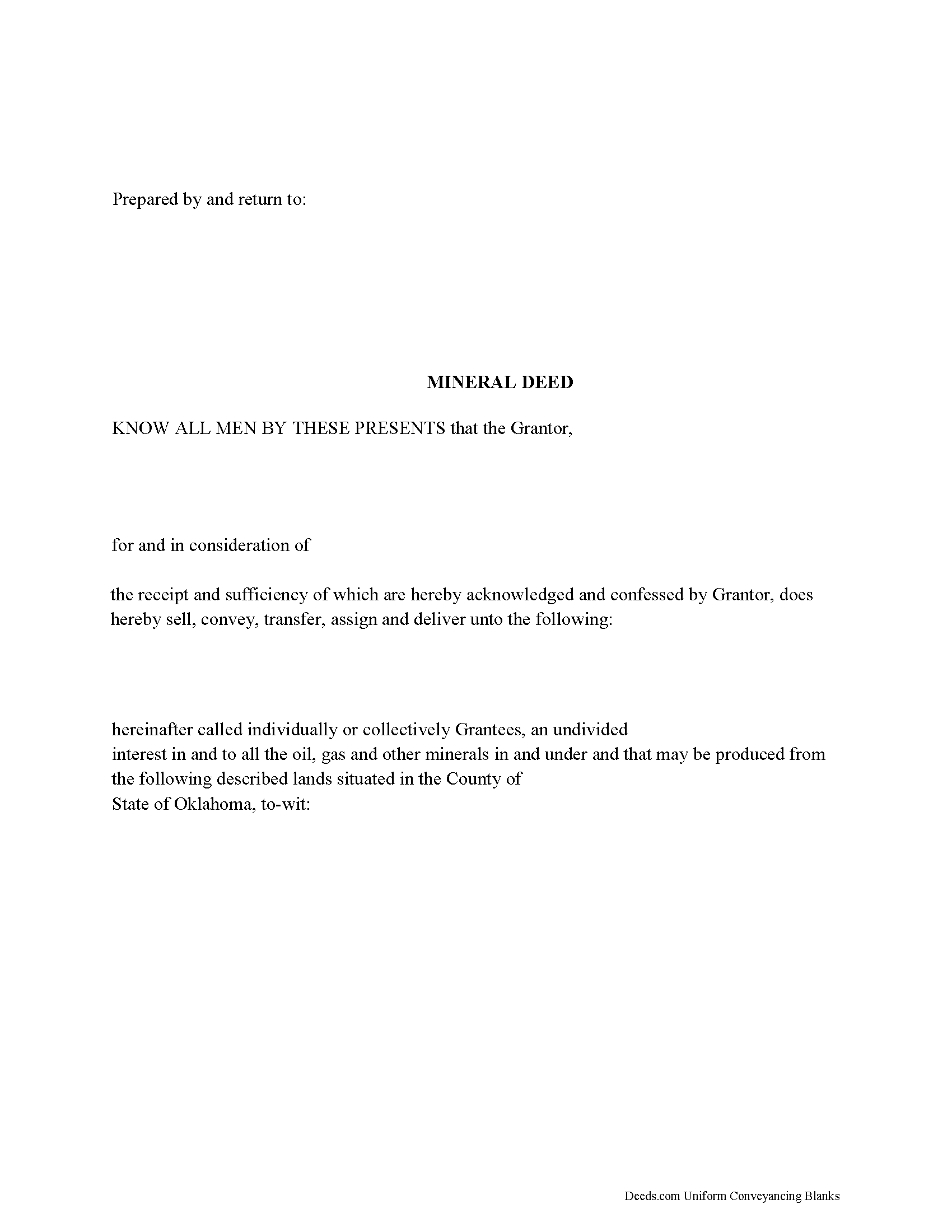
The General Mineral Deed in Oklahoma transfers oil, gas, and mineral rights from the grantor to the grantee. THIS IS NOT A LEASE. There are no Exceptions or Reservations included.
The transfer includes the oil, gas and other minerals of every kind and nature. It also transfers any and all rights to receive royalties, overriding royalties, net profits interests or other payments out of or with respect to those oil, gas and other minerals. The Grantor can stipulate the percentage of Mineral Rights the Grantee will receive and is made subject to any rights existing under any valid and subsisting oil and gas lease or leases of record.
This general mineral deed gives the grantee the right to access, for the purpose of mining, drilling, exploring, operating and developing said lands for oil, gas, and other minerals, and storing handling, transporting and marketing of such.
In this document the Grantor Warrants and will defend said Title to Grantee. Use of this document has a permanent effect on your rights to the property, if you are not completely sure of what you are executing seek the advice of a legal professional.
(Oklahoma MD Package includes form, guidelines, and compl... More Information about the Oklahoma Mineral Deed
Mineral Deed with Quitclaim Covenants
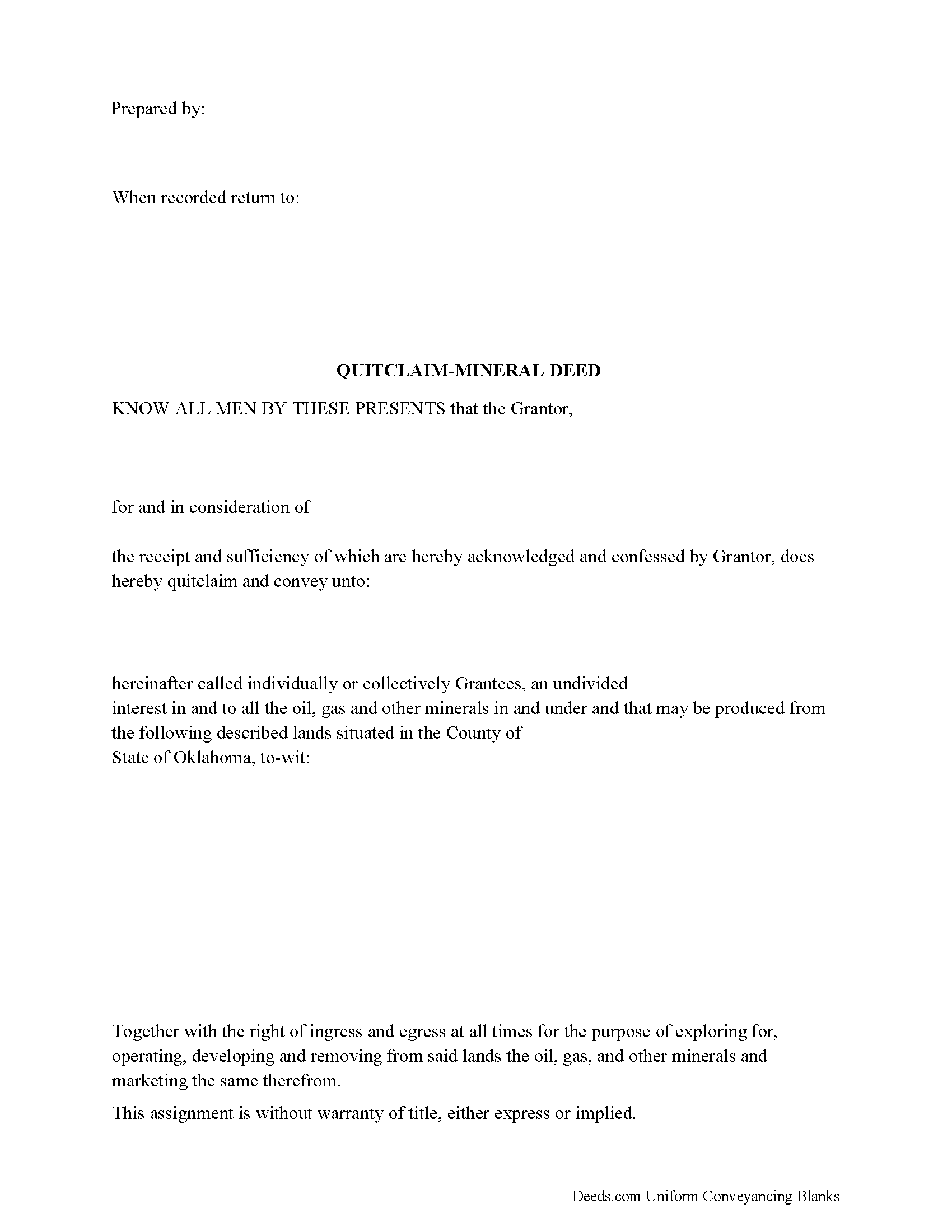
The General Mineral Deed in Oklahoma Quitclaims oil, gas, and mineral rights from the grantor to the grantee. THIS IS NOT A LEASE. There are no Exceptions or Reservations included.
The transfer includes the oil, gas and other minerals of every kind and nature. The Grantor can stipulate the percentage of Mineral Rights the Grantee will receive.
This general mineral deed gives the grantee the right to access, for the purpose of mining, drilling, exploring, operating and developing said lands for oil, gas, and other minerals, and storing handling, transporting and marketing of such.
The seller, or grantor Quitclaims the mineral rights and does NOT accept responsibility to any discrepancy of title (This assignment is without warranty of title, either express or implied)
Uses: Mineral deeds with quitclaim are often used in situations where the grantor wants to quickly release any interest they might have in mineral rights, such as in settling estates, resolving disputes, clearing up uncertainties about ownership in a title's history or when mineral rights have previously been severed or fragmented from surface rights and cloud a title, making it difficult to transfer propert... More Information about the Oklahoma Mineral Deed with Quitclaim Covenants